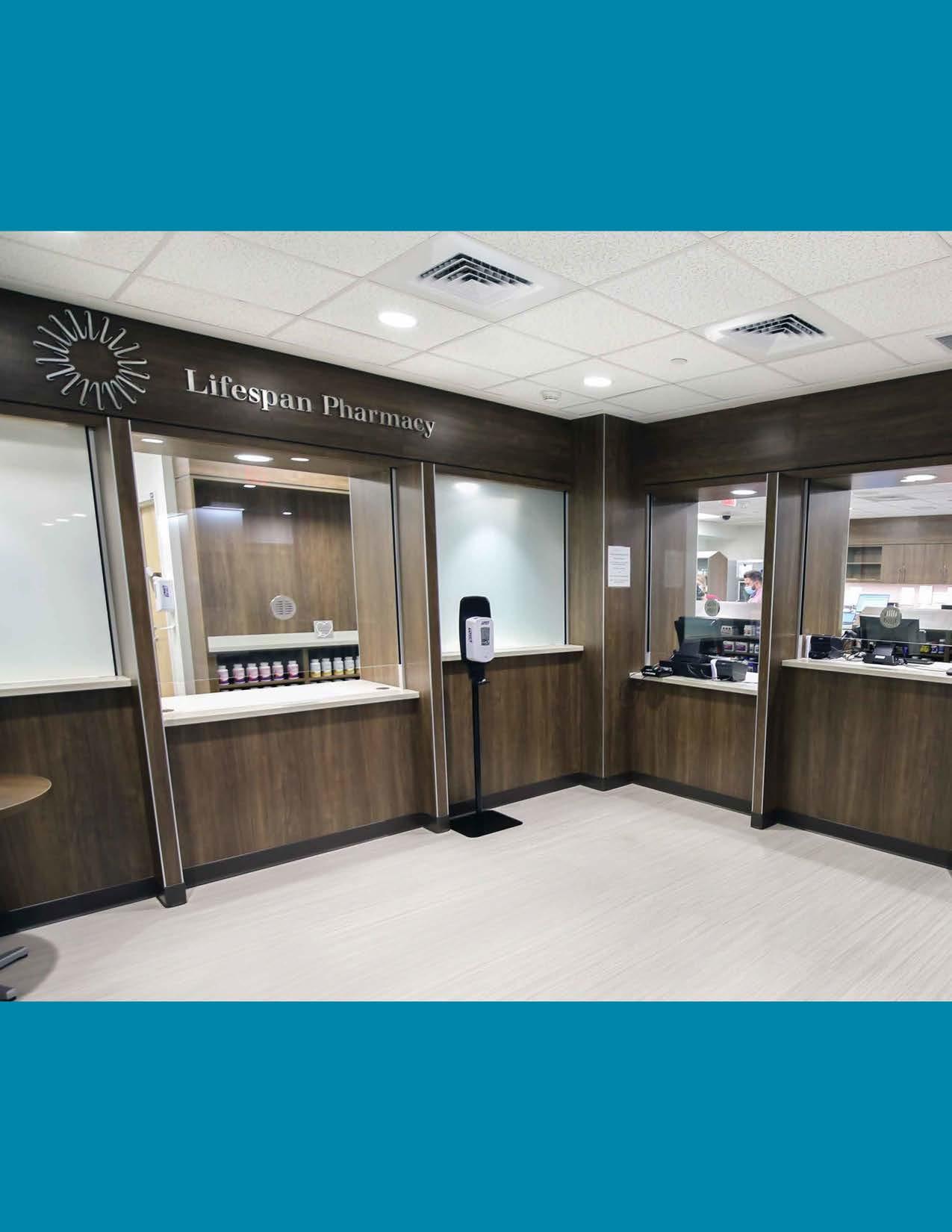PHARMACY SERVICE LINE
ANNUAL REPORT 2022




Cohesion. Grit. Perseverance. Spirited enthusiasm. Innovation. Opportunity. Accomplishments.
These are the words and phrases that come to mind when refecting on our past year. We certainly had our challenges: severe pharmacist and pharmacy technician staffng shortages, Covid surges, drug shortages, fnancial recovery efforts, multiple competing projects and priorities, etc. But our cohesion kept us together as a team and our grit and perseverance got us through it. That could have been the end of the story, but not for us. We didn’t want to settle for “just getting through it”, so our spirited enthusiasm kicked in and sparked great innovation, opportunities, and accomplishments.
The results are refected in the pages that follow. Here are just a few highlights:
• Enhanced medication safety and outcomes through advanced data science tools, new technology, and expansion of our clinical services. Reported several potential safety hazards to the Institute of Safe Medication Practices (ISMP), which also promoted improvements in medication safety nationally.
• Implemented new stewardship programs, modeled off our long-established antimicrobial stewardship. Programs added or expanded this year include the areas of anticoagulation, glycemic control, blood factors, opioids, and pharmacogenomics.
• Expanded pharmacy residency, both through initiation of new programs and growth of existing ones. This supports to our commitment to academics, provides high-value resources, and serves as a pipeline of pharmacist specialists with advanced training. We also continued to grow our compliment of longitudinal students.
• Contributed to fnancial recovery efforts for the organization through several initiatives that increased operating margin. These included retail and specialty pharmacy revenue growth, 340B contract pharmacy reinstatement process to offset manufacturers’ counter actions, and drug savings initiatives.
• Ensured medication access for our patients. Drug shortages were signifcant but our pharmacy purchasing, clinical, operational, and data analytics teams collaborated with the medical staff to insulate our patients from them. For outpatient prescriptions, we expanded our access services (e.g., fnancial assistance, prior authorization, refll authorization) to new clinics, removing these treatment barriers for more patients.
• Strengthened research commitment through creative restructuring of our residency research model. Also expanded academic contributions through increased university faculty appointments for the training of pharmacy, medical, physician assistant, and advanced practice nursing students.
• Advanced training and development through achievement of national board certifcation and advanced degrees by several of our pharmacists, pharmacy technicians, and information technology specialists, increasing the proportion of employees with specialized training and competencies. Also enhanced the career ladder and opportunities for pharmacy technicians.
• Achieved national awards that refect the collective contributions of the pharmacy team and establish Lifespan’s pharmacy service line as a national leader.
• Developed strategic plan for the next three years that builds off our current, highly successful, strategic plan, aligns with the organization’s priorities and objectives, and sets an exciting path forward.
• Promoted innovation through our frst annual Innovation Challenge. We had 39 submissions, representing all Lifespan affliates, which demonstrates the enthusiasm and dedication of our team in ensuring excellence.
None of this would have been possible without the outstanding pharmacy team we have across the Lifespan system, supported by our highly competent, talented, and dedicated pharmacy leadership team. It is my great fortune to work with such a strong and accomplished team. The support of Lifespan’s executive leadership has also been essential to our success, in particular Dr. Ken Wood with his inspiring guidance and strong advocacy on our behalf.
It is an honor and privilege to lead a team that I am so proud of – well done! Looking forward to the new opportunities in the year ahead…

The contributions and accomplishments of the pharmacy service line over the past year have been extraordinary, especially against the backdrop of considerable challenges faced by health systems. We appreciate the undeterred dedication of the pharmacy team and its leadership and the continued forward momentum to achieve clinical, operational, and fnancial excellence despite these times of adversity.
The signifcant fnancial contributions of the pharmacy service line are well known to executive leadership, highly appreciated, and essential to the fscal viability of our health system. The pharmacy service line’s contributions towards improved clinical outcomes, medication safety, and operational effciency are similarly deserving of acknowledgement. We are fortunate at Lifespan to have a pharmacy team with such strong expertise and high reliability – along with their enthusiasm to embrace innovation, technology, and data science – caring for our patients and supporting our providers and employees.
I look forward to supporting the pharmacy team members as they progress through their strategic plan.

Mission
To enrich our community’s health by providing exceptional and innovative pharmacy services.
Vision
To transform pharmaceutical care through innovation and adherence to the highest clinical standards.
Values
Compassion Delivering medications to patients with care and empathy.
Excellence Providing our patients with the safest, highest quality of care possible, continually improving our systems and measuring our performance.
Innovation Committed to pursuing contemporary medication practices and engaging all pharmacy team members to be innovative thinkers.
Integrity Ensure accountability and respect while adhering to the highest standards of morals and ethics.
Teamwork Work collaboratively across pharmacy services and with multidisciplinary care teams.
Lifespan, Rhode Island’s frst health system, was founded in 1994 by Rhode Island Hospital and The Miriam Hospital. A comprehensive, integrated, academic health system affliated with The Warren Alpert Medical School of Brown University, Lifespan’s present partners also include Rhode Island Hospital’s pediatric division, Hasbro Children’s Hospital; Bradley Hospital; Newport Hospital; and Gateway Healthcare.
253 Pharmacists
21 Pharmacists have advanced degrees (e.g., MBA, MPH, JD)
65* Pharmacists are board certifed *7 dual-certifed
25 Pharmacists completed a PGY1 residency
34 Pharmacists completed both PGY1 and PGY2 residencies
217 Technicians
14 Pharmacy residents
37% Residents that stay with Lifespan after completing residency
Our Hospitals
16,564 Employees
1,165 Licensed beds
13 Pharmacy locations
Scholarship & Research
85 APPE/IPPE rotations complete
44 Publications, grants, abstracts
25 Poster and platform presentations
Central Pharmacy Services
9,452,386 Doses dispensed
104,218 Compounded sterile products prepared
Clinical Pharmacy Services
343,230 Order interventions
Infectious Disease & COVID-19 Response
1,395 Antimicrobial Stewardship (AMS) interventions
5,166 COVID-19 vaccines prepared & administered
Medication Policy & Safety
40% of staff-reported medicationrelated safety events were “good catch” prevented errors, signaling a strong culture of reporting.
5 Medication safety topics submitted to ISMP which were published in nationwide Medication Safety Alert.
>95% Medication barcode scanning rates (Leapfrog-defned units).
>98% Smart pump infusion drug library compliance with Epic interoperability.
Ambulatory Pharmacy Services
Outpatient Pharmacies
355,098 Prescriptions dispensed to
43,525 unique patients
Specialty Pharmacy Patient Management Program
>95% Patient satisfaction
Ambulatory Pharmacy Services
> 15,000 Clinical encounters
13 Collaborative practice agreements and protocols
$480K Savings secured through Patient Assistance Programs.
Pharmacy Technology Team
193,200 Opioid prescriptions evaluated by an internally developed machine learning model to identify outlier prescribing patterns for follow-up.
95 Epic system improvements/maintenance requests completed per month Innovation
39 Submissions
Overview of Services
• Order Verifcation – Review medication orders before frst dose is administered. Intervening and providing recommendations where necessary to ensure patient safety and therapeutic effcacy.
• Medication Stewardship – Proactive review of active high-risk medication (i.e., antithrombotics) orders to ensure they are evidence-based, effective, safe, and fnancially appropriate.
• Patient Monitoring – Unit-based pharmacists review patient profles and monitor medication therapy for optimization opportunities.
• Targeted Drug Monitoring – Review patients with renal insuffciency, medications with important serum concentrations, critical labs, and patients receiving age-inappropriate high-risk medication.
• IV to PO Conversion – Monitor for opportunities to convert patients from IV to oral medication.
• Patient Care Rounding – Participate in rounding activities with medicine and critical care teams.
• Code Blue Response – Assist with adult Code Blue activations throughout the hospital, ICU, and Emergency Department.
• Medication Safety – Monitor medication related safety events for process improvement opportunities and facilitate hospital medication safety meeting.
• Drug Information – Available 24 hours daily as a resource for drug information for all hospital staff and subject matter experts on select committees.
• Investigational Drug Services – Pharmacists coordinate proper storage and dispensing of investigational drugs for clinical trials and serve on the Institutional Review Board for Rhode Island Hospital.
• Admission Medication Reconciliation – Construct the best possible medication history for adult patients admitted through Emergency Department and compare it against the accuracy of orders placed during admission.
• Pharmacy Transitions of Care – Pharmacy consult service that helps coordinate the continuity of care for chronic obstructive pulmonary disease (COPD), congestive heart failure (CHF), myocardial infarction (MI), and pneumonia (PNA) patients.
• Non-Sterile and Sterile Compounding Services – Safe preparation of medications in a fnal dosage form for administration to patients.
• Controlled Substance Accountability Support – Pharmacist and technician responsible for partnering with area leadership to resolve any controlled substance discrepancies and perform audits.
• Purchasing, Repackaging and Distribution Services – Provides logistical support for purchasing and distribution of medications both on and off campus.
• Antimicrobial Stewardship (AMS) – Implementation of order sets, patient lists, guidelines, and other initiatives that promote optimal antimicrobial use. Additionally, pharmacists round with the infectious disease (ID) consult team, complete prospective review of antimicrobials, and monitor for necessity of dose adjustments.
• Emergency Medicine Services – Pharmacist specialist in the Emergency Department that assists with critical disease state management and drug information.
• Critical Care Services – Clinical and specialist pharmacists rounding in ICU as part of interdisciplinary team.
• Internal Medicine Services – Clinical and specialist pharmacists rounding with medicine hospitalists and residents as part of interdisciplinary team.
• Pediatric Services – Clinical and specialist pharmacists rounding in pediatric patient care areas as part of interdisciplinary team.
• Transplant Services – Pharmacist specialist rounds with inpatient and outpatient transplant care teams.
• Supported heparin infusion protocol changes that decreased time to therapeutic anti-Xa by 10 hours, time to frst therapeutic anti-Xa by 15 hours, and the average number of laboratories draws by 1.5 (estimated ~$128K cost avoidance).
• Supported conversion of Keppra IV to IV push for doses ≤= 1500 mg, which resulted in ~$70K drug cost savings and ~2K less nurse mixes on the patient care unit.
• Revamped system wide pharmacy-to-dose warfarin protocol, a service that now results in >100 consults per month.
Reduction in the time required to reach therapeutic anticoagulation with IV heparin.
“Lifespan clinical pharmacy specialists perform ongoing quality improvement activities. Our heparin infusion protocol was evaluated and dramatically improved, and our hospitalized patients are now better protected from stroke, pulmonary embolisms, and deep vein thrombosis.”
DIRECTOR,• Expanded pharmacy technician career ladder by creating new advancement positions including Pharmacy Technician Specialist, Oncology and Sterile Compounding; Pharmacy Technician Supervisor.
To see additional accomplishments, click here.

The inpatient pharmacy supports 719 beds including 87 at Hasbro Children’s Hospital, Rhode Island’s only Level I Trauma Center, and the principal teaching hospital of The Warren Alpert Medical School of Brown University.

Major Accomplishments
• Redesigned institutional Advanced Pharmacy Practice Experience (APPE) learning experience, expanded Longitudinal Advanced Pharmacy Practice Experience (LAPPE) program positions from 3 to 7, and implemented a pharmacy student frst dose counseling initiative reaching >350 patient encounters to date.
• Launched antithrombotic stewardship program that has coincided with a 7% performance improvement on Vizient Q&A 2022 warfarin-elevated INR data.
• Supported inpatient pharmacy technician Your Voice engagement score increase of 16%.

To see additional accomplishments, click here
The inpatient pharmacy supports a 247-bed, complex care teaching hospital that includes medical units, surgical units, critical care, oncology, and emergency medicine.
Major Accomplishments
• Implemented PGY1 pharmacy residency program and hosted inaugural pharmacists.
• Implemented charge pharmacist positions on day and evening shift to establish a development and succession pathway for administrative roles.
• Promoted pharmacy-to-dose warfarin to cover greater than 50% of all warfarin orders managed by pharmacy. This correlated with a reduction in the incidence of INR ≥ 5.0 from 5.81% to 2.82%.
To see additional accomplishments, click here
The inpatient pharmacy supports a 129-bed community hospital that includes medicalsurgical units, behavioral health, labor and delivery, inpatient rehabilitation, oncology, and emergency medicine.

Major Accomplishments
• Implemented profled Omnicell cabinet in the Post-Anesthesia Care Unit and SafetyStock barcode scanning in the Emergency Department.


• Earned the Newport Hospital President’s Award for signifcant contribution to the mission and vision of Newport Hospital.
• Enhanced clinical interventions through revised and upgraded IV to PO and warfarin protocols.
• Improved employee engagement scores to become a leading department in the organization.
Bradley Hospital was the nation’s frst psychiatric hospital for children and continues to provide acute inpatient services and partial hospital programs at their 70-bed facility, as well as offering wide-ranging outpatient programs that include both residential and school-based services.
Major Accomplishments
• Increased integration and alignment of services with Hasbro Children’s Hospital for pediatric behavioral health patients, including medication profle review, guideline and order set review, and assessment of Omnicell stock of behavioral health medications in ED areas.
• Initiated the Meds to Beds program in August 2022.
• New Omnicell for the new Children’s Partial Hospital Program in East Greenwich.
• Hosted frst PGY1 resident.
• Successful Joint Commission review.
Overview of Services
Patient Care Services

Clinical pharmacists and clinical pharmacist specialists work collaboratively with the patient care team in a decentralized model. Clinical specialists act as the team lead with highly trained, engaged, and motivated clinical pharmacists to provide unit-based services on adult and pediatric medical, surgical, critical care and specialty patient care units. Pharmacists participate in daily patient care rounds and provide order verifcation, medication management, Code Blue response, consultative, and select patient management by Pharmacy and Therapeutics Committee approved protocols. Clinical pharmacist specialists were added in infectious diseases, internal medicine, and antithrombotic stewardship. Critical care specialist services have expanded into the evening shift at Rhode Island Hospital (RIH). Emergency medicine clinical services have been established in the Hasbro Children’s Hospital (HCH) and at The Miriam Hospital (TMH). Evening and night clinical services have been expanded into the adult emergency department at RIH.
Hours of Operation
24 hours/day, 7 days a week
Reduce risk of readmission by providing in-depth medication and disease state education to hospitalized patients with Centers for Medicare and Medicaid Services (CMS) qualifying high-risk disease state: chronic obstructive pulmonary disease (COPD), heart failure (HF), acute myocardial infarction (AMI), coronary artery bypass graft (CABG) surgery, elective primary total hip arthroplasty and/or total knee arthroplasty (THA/TKA), and pneumonia.
Locations and Hours of Operation
Rhode Island Hospital and The Miriam Hospital
Monday – Friday, 8 a.m. – 4:30 p.m.
Educational Services
Clinical pharmacists and clinical pharmacist specialists provide education during nursing and physician orientation and during patient care rounds and conferences. They also serve as preceptors for the University of Rhode Island College of Pharmacy, Massachusetts College of Pharmacy and Health Sciences, Northeastern University School of Pharmacy, and the pharmacy residency training programs. Many clinical pharmacist specialists hold adjunct faculty positions at the Rhode Island College of Nursing graduate program, and the Johnson & Wales University and Bryant University Physician Assistant programs, where they teach advanced therapeutics. Infectious diseases clinical specialists hold faculty positions in the Warren Alpert School of Medicine at Brown University and lecture in the Lifespan radiation technology training program.
Formulary management is a process which allows pharmacists, physicians, nurses, and other healthcare providers to work collaboratively and promote evidence-based, cost-effective medication therapy and optimize patient outcomes Clinical pharmacist specialists complete annual needs assessments and then
further develop and maintain the formulary, therapeutic guidelines, and protocols. They also participate on departmental, unit-based, hospital, and health system committees to lead formulary-related initiatives for quality improvement, information technology, clinical research, order set and treatment plans, and medication safety.
Clinical pharmacist specialists act as the recording secretary and set the agenda for the oncology, antithrombotic, and ambulatory subcommittees of the Lifespan Pharmacy and Therapeutics Committee. Pharmacy leadership advances the coordination and approval activities of the Lifespan Pharmacy and Therapeutic Committee and systemwide LifeChart order set committee.
Major Accomplishments
• Response to drug shortages with the potential to impact patient care:
» The COVID-19 pandemic and supply chain issues challenged clinical services to identify necessary protocol and guideline revisions.
» Clinical specialists worked collaboratively with subject matter experts and other members of the care team to identify and implement alternative therapies and treatment plans. Alerts were developed in collaboration with the pharmacy information technology team to notify prescribers of alternative therapies.
◊ Injectable benzodiazepines (diazepam and lorazepam): Developed electronic alternative alerts for providers to consider the use of enteral formulations, revised the pulmonary critical care alcohol withdrawal protocol, revised the CIWA protocol used on adult medical/surgical units, and lead a multidisciplinary task force to improve provider awareness and identify additional opportunities.
• Antithrombotic Subcommittee of the Pharmacy and Therapeutics Committee
» The pharmacy completed an intravenous heparin medication use evaluation. The subcommittee reviewed the results and identifed opportunities to improve the effciency and safety of the existing adult heparin protocols. The improvements implemented led to a decrease in time by ten hours to therapeutic anti-Xa, time to frst therapeutic anti-Xa by 15 hours, and the average number of laboratories by 1.5.
• Antimicrobial Stewardship Team
» The team developed a policy and procedure and order panel to support the administration of extended infusions of piperacillin/tazobactam in adult and pediatric patients.
• Formulary Management Activities
» Process owners and clinical specialists help identify and participate in initiatives with the Vizient Northeast Purchasing Coalition and Oncology Network.
◊ Lifespan received the Vizient Northeast Purchasing Coalition Pharmacy Elevate Award in October 2022.
• Recruited an experienced clinical pharmacist specialist to lead Lifespan Transitions of Care program optimization in FY23 with the following guiding principles and goals:
» Maximize patient outcomes
◊ Prioritize patient encounters based on CMS Hospital Readmissions Reduction Program and validated readmission risk stratifcation tools (i.e., HOSPITAL score or LACE index)
» Maximize throughput/patient encounters per day
◊ Optimize LifeChart to support workfow
» Build and monitor program performance via PowerBI
To see additional accomplishments, click here.
The Pharmacy Investigational Drug Services (IDS) supports clinical investigators conducting research on promising experimental therapies across medical specialties. The IDS coordinates investigational drug dispensing and storage with the clinical investigator for all clinical drug trials approved by the Committee on the Protection for Human Subjects (IRB). The IDS is available to principal investigators for the coordination and management of clinical drug trials, and provides the following services:
• Procurement and receipt of study drug, storage, or distribution, as appropriate. Shipments are inspected, contents verifed, and inventory logs updated. Secure investigational drug storage at frozen, refrigerated, and room temperatures, monitored continuously and recorded via a wireless electronic system.
• Maintenance and routine audits of perpetual inventory study drug logs.
• Return of unused or expired study drug to sponsor or destruction as either hazardous or nonhazardous waste in accordance with Pharmacy Services policy “Disposal of Unusable Drugs” (PH321).
• Establishment of procedures for randomization, documentation, preparation, labeling, and dispensing of the study drug per protocol. Maintenance of study records including, but not limited to, updated copy of the protocol and investigator brochure, accountability logs, shipping invoices, storage temperature records, name of the principal investigator and study contact.
• Provide clinical content to LifeChart analyst for build of medication entries (ERX) or order panels. Develop Beacon treatment plans and therapy plans as part of multidisciplinary team.
• Randomization/treatment assignment of patient. Pharmacists are experienced with interactive voice and web response systems, randomization logs and other randomization systems.
• Maintain integrity of blinded studies. IDS Pharmacists available for emergency un-blinding.
• Drug preparation, including but not limited to, sterile parenteral formulations for hazardous and nonhazardous medication and non-sterile study drug capsules with matching placebos.
• Design of randomization schedules, perform clinical review (e.g., patient profle, protocol, order validation), assess patient adherence, complete IVRS/IWRS transactions, and extract data to create custom reports.
While Rhode Island Hospital (RIH) has a strong oncology and memory disorders research group, the Miriam Hospital (TMH) focuses on infectious disease and immunologic research. The oncology clinical trials are offered to patients from all the Lifespan Cancer Institute locations. Other important research groups that are supported include the emergency department, nephrology, and cardiac research.
Monday-Friday: 7 a.m. – 3:30 p.m.
For off hours services, investigational drugs are dispensed by staff pharmacists. Study monitor visits, study meetings, and teleconference available by appointment.
• Testing and implementation of nCOUP Software
» nCOUP is an accountability software system that increases accuracy and effciency in clinical trial pharmacy inventory management. The system integrates with electronic medical record (EMR) systems to eliminate the signifcant double entry of data related to patients and protocols, thus reducing the associated risk of entry errors. Some features of nCOUP include:

◊ Double signature verifcation
◊ Barcoded inventory labels
◊ Physical inventory monitoring
◊ Par level management
◊ Pharmacy billing
Lifespan Pharmacy Data Science, Analytics and Automation promotes and enables data driven decision making, outcome monitoring, effcient operations, and optimization of medication storage technology. The program is composed of fve technology professionals. Services provided include:
• Administrate and maintain information distribution channels
» Pharmacy intranet server, providing over 200 web pages of clinical and operational content
» Pharmacy Sharepoint network
» Pharmacy Teams network
• Develop and maintain a suite of pharmacy focused analytics solutions supporting all aspects of pharmacy-based patient care, research, and business operations
» Ad-hoc and on-demand reporting needs
» Clarity certifed reporting
» Clinical and operational outcomes monitoring dashboards
» CSDPP (Controlled Substance Diversion Prevention Program) support
» Lifespan Specialty Pharmacy drug access, payor network access and accreditation reporting
» Over 100 scheduled reports
» Over 250 PowerBI reports
» Predictive analytics and machine learning solutions
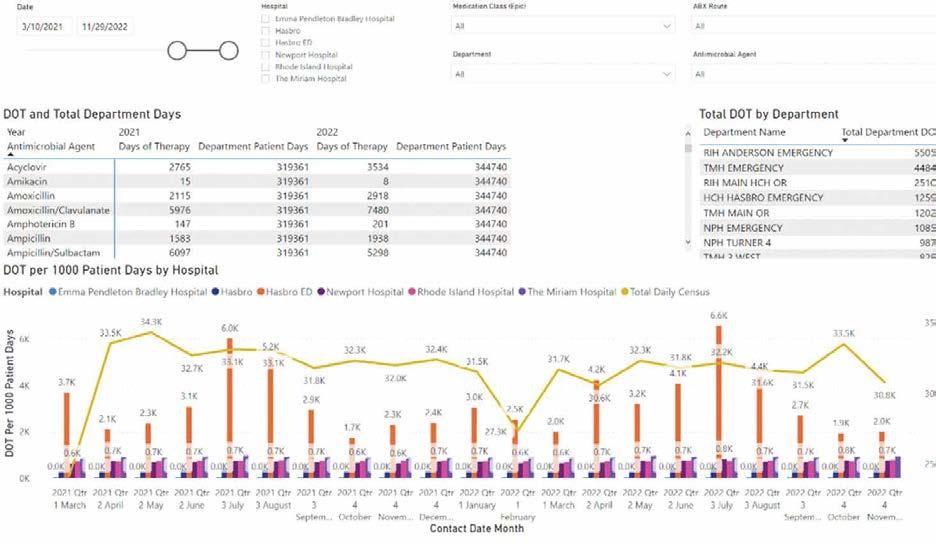
• Develop and maintain custom software suites
» Electronic Chemotherapy Status Board (eCSB)
» Pharmacy Research and Publication Council workfow suite
» PharmNotes web-based software solution
» Sage pharmacy workfow suite
• Develop and maintain the Pharmacy Data Warehouse containing data from multiple sources including:
» Aeroscout temperature monitoring
» Amerisource Bergen drug wholesaler
» Omnicell medication dispensing cabinets
» RxStrategies 340B third party administrator
» Shields pharmacy services
» Therigy Clinical Assessment System
» Vizient Clinical Database
» Wellparter 340B third party administrator
• Participate in system-wide committees including:
» Predictive Analytics Guidance Council
» Report Prioritization Huddle
• Provide 24 hour daily on-call technical support for the pharmacy.
• Support and administrate over 290 automated dispensing cabinets
• Support and maintain pharmacy focused Filemaker software system including:
» Employee database
» Investigational drug support
» Sterile compounding
Hours of Operation
Monday-Friday: 8:30 a.m. – 5 p.m. 24 Hour On-Call Support
• Developed an automated alert system that identifes when a Pharmacist Technician loads a medication that was not intended to be ordered.
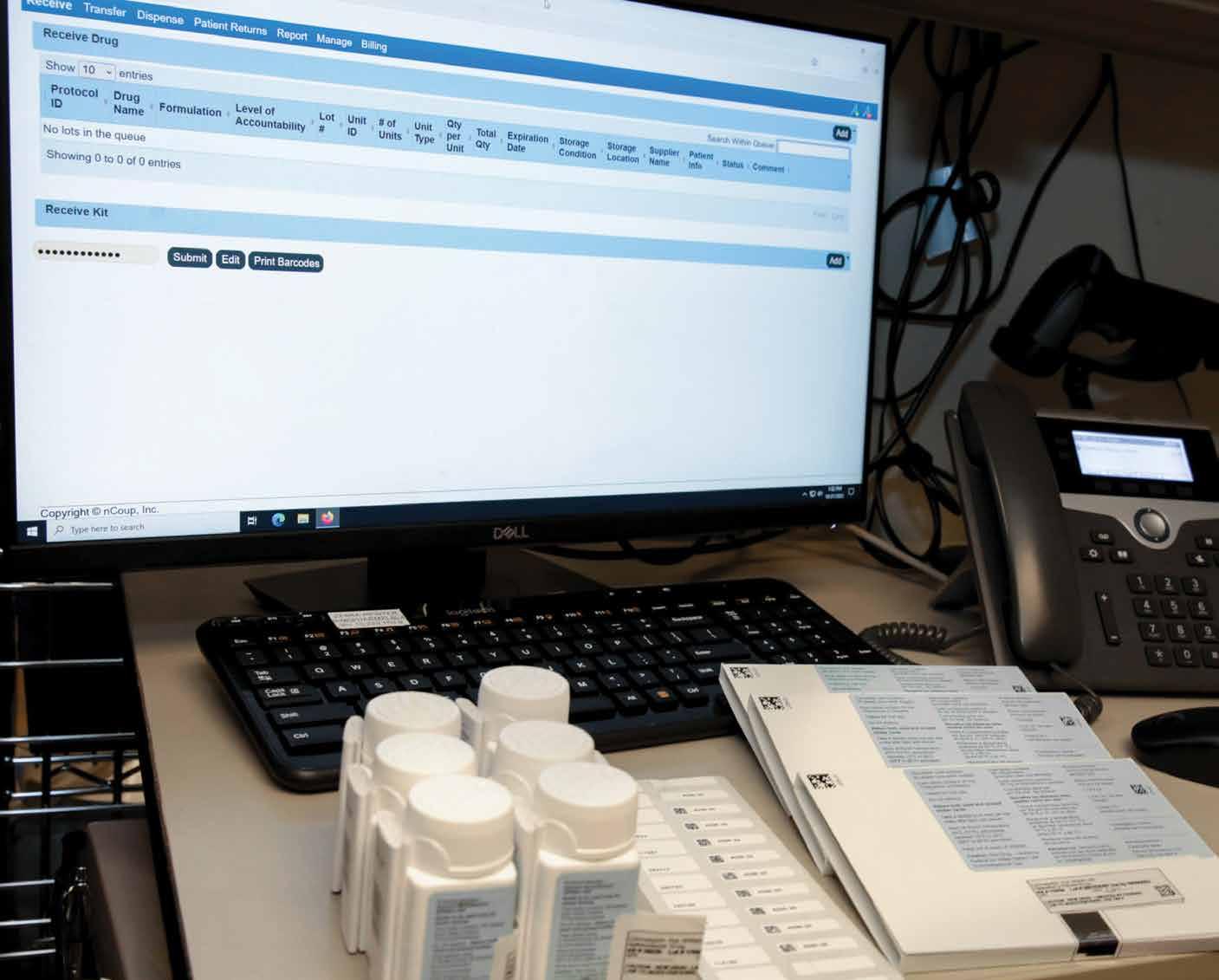
» This report helps catch medication errors in real time.
» Example: A technician loading Pregabalin 50mg capsules but accidentally selecting Pregabalin 50mg tablets
• Developed a reporting suite for the Medication Assistance Program to help them track the turnaround time for initiation messages, main refusal reason by department and pharmacist, and the history of the program’s authorizations, reroutes, and refusals.
• Retooled Clinic and User Prescription Capture reporting suite to track individual contact points between patients and pharmacy resources. These updates add productivity tracking functions to the reporting suite while also improving capture opportunity estimates.
• Developed a Days of Therapy reporting that accurately calculates antimicrobial Days-Of-Therapy. The suite allows for antimicrobial stewardship tracking from organization level down to individual patient.
To see additional accomplishments, click here
The pharmacy clinical informatics team coordinates and provides oversight to medication related clinical content in applications including LifeChart (inpatient Epic), Willow Ambulatory (outpatient Epic), Omnicell (automated dispensing cabinets), Sage (automated dispensing), and CAPS (third party compounding vendor).
The pharmacy clinical informatics team is comprised of 4 pharmacists and a pharmacy technician.
The team reviews all requests to add/revise/delete clinical content on medications submitted by prescribers, nurses, pharmacists, respiratory therapists, etc. Approval from the pharmacy clinical informatics team is necessary prior to any revisions to medication clinical content.
The pharmacy clinical informatics team collaborates on the creation and revisions to additional medication related content including but not limited to:
• Order panels
• Order sets
• Dose standardization (rule based) protocols
• Therapy plans/treatment plans
• Patient monitoring lists
• Therapeutic drug monitoring initiatives
• Therapy plan/treatment plan templates
• Restricting antibiotics
• Order questions
• Investigational medication build
• Investigational order panel build
• Investigational therapy plan/treatment plan build
• Cart fll build to facilitate med deliveries
95%
98% Medication Barcode Scanning Rates (Leapfrog-defned units)
Smart Pump Infusion Drug Library Compliance
“ We are continuously working to optimize systembased safeguards, leveraging our medication safety technology to keep our patients safe and protect our staff from preventable human factor related errors. We work in partnership with our nursing and provider partners to establish a culture of safety and adherence to high reliability principles.”
– DON MCKAIG, DIRECTOR, MEDICATION SAFETY, QUALITY, AND PHARMACY INFORMATION TECHNOLOGYAdditionally, the pharmacy clinical informatics team:
• Manages select preference lists (facilitates appropriate prescribing)
• Manages medication lists (aids in appropriate NDC selection and dispensing).
• Assigns and manage inbasket pools for all pharmacy users.
• Collaborates with IS on reviewing and prioritizing all medication related service requests, based on impact and safety concerns.
• Collaborates with IS to facilitate monthly First Data Bank updates adding/revising/deleting as appropriate packages, products, clinical alerts, and barcodes.
• Collaborates with the Alerts team on getting proper clinical alerts to fre.
• Maintains online formulary pursuant to P&T committee actions.
• Provides consultations on SafetyNet’s for events/near misses that involve medication systems.
• Collaborates with IS on building and maintaining proper submission forms and testing scripts to ensure new medication build quality and integrity.
• Reviews all integrated test scripts used by IS to vet each Epic quarterly upgrade.
• Adds initial costs to all new NDCs (GPO, WAC, 340B costs provided by pharmacy purchasing team).
• Assists coders/billers with inpatient claims by reviewing clinical documentation on unclear claims.
• Troubleshoots insurance and pricing issues for retail pharmacy.
• Creates ‘blocks’ on specifc NDCs to drive staff to select preferred NDCs for 340B accumulation.
• Assigns and maintain medication barcodes and scanning database.
• Assigns new products Omnicell Identifers (Omni IID’s) and collaborate with pharmacy automated dispensing team on creating new Omnicell entries.
• Collaborates with pharmacy integrated technology team and purchasing team on new Sage (automated dispensing) and Formulary Master (stockroom) entries.
• Assists pharmacy staff with system and workfow troubleshooting.
• Precepts pharmacy students in a 6-week advanced pharmacy practice informatics rotation.
• Precepts PGY1 and PGY2 pharmacy residents in 4-week pharmacy informatics rotations.
• All the clinical informatics pharmacists attained certifcation as Epic Inpatient Pharmacist Clinical Tools Builders.
• Creation and continual updates of medication (ERX) records for every newly approved med and vaccine for Covid-19 including remdesivir (Veklury®), tociluzumab (Actemra®), baricitinib (Olumiant®), tixagevimab/cilgavimab (Evusheld®), nirmatrelvir/ritonavir (Paxlovid®), molnupiravir (Lagevrio®), bebtelovimab, Comirnaty®, Spikevax®, and others.
• Improved effciency and safety of outpatient compounding process by creating access to the compounding recipes on the pharmacist’s order verifcation screen, instead of making them manually access a separate program.
To see additional accomplishments, click here.
The Center for Medication-Use Policy, Safety, and Outcomes is the team within the Pharmacy Service Line responsible for the oversight and development of strategies to improve the safety, effciency, and appropriateness of the medication-use system. The Center tightly integrates activities with other teams in the Pharmacy Service Line including operations, clinical services, informatics, business operations, and impact and outcomes. The Center is responsible for the oversight of the development and implementation of goals and objectives in the following areas:
• Ensuring medication policies and practices support safe and effective medication use and maintain compliance with regulatory requirements.
» Oversight of medication event reporting review and development of targeted improvement initiatives based on evaluation of system-based and human-based factors.
» Coordination of Medication Safety Team activities across the Lifespan system in both inpatient and outpatient care areas.
» Development and monitoring of key process metrics (KPMs) related to medication continuous quality improvement (CQI), which may include:
◊ Safety event reporting, serious patient safety events
◊ Effective use of medication safety technology (barcode scanning, smart pump compliance, medication overrides)
◊ Incidence of adverse drug events (e.g., Vizient warfarin/INR and insulin/hypoglycemia).
◊ Pharmacist intervention review and trending.
» Evaluation of self-assessments and safe practice recommendations from accreditation and regulatory bodies, as well as other standard-setting organizations, including:
◊ Center for Medicare and Medicaid Services (CMS) and The Joint Commission (TJC)
◊ Institute for Safe Medication Practices (ISMP) including:
• Medication Safety Alerts and Quarterly Action Agendas
• Targeted Medication Safety Best Practices (TMSBP)
• Focused medication-use self-assessments
◊ American Society of Health System Pharmacists (ASHP) best practices
◊ Vizient High-Value Pharmacy Enterprise document
» Support, track, and develop specifc interventions to ensure compliance with Risk Evaluation and Mitigation Strategies (REMS) programs.
» Leads the review of nationwide regulatory readiness standards and ensures pharmacy related policies and medication-related standards are in compliance.
• Ensuring hospital-based guidelines support a patient-centered, evidence-based, and fscally responsible approach to medication utilization.
» Coordination of the Pharmacy and Therapeutics (P&T) Committee and formulary management activities across the Lifespan system.
» Collaboration with pharmacy informatics and Lifespan IS teams and committees (e.g., Joint Order Set Committee) to ensure appropriate implementation of medication-use policy decisions in LifeChart.
» Tracking, review, and trending of non-formulary medication use.
» Analysis of data on drug utilization trends, including the Vizient CDB and other analytics tools developed locally (e.g., PowerBI).
» Identifcation and action planning of optimization opportunities identifed through collaborations with purchasing coalitions (I.e., Northeast Purchasing Coalition, Vizient Oncology Network).
• Establishing organized, ongoing, criteria-based processes to evaluate the effectiveness of medication use and compliance with established therapeutic guidelines.
» Prospective identifcation of outcomes metrics for new or updated guidelines or formulary changes and recommendations for methods to monitor the results.
» Establish standards for data collection, structure, and performance of medication-use evaluations (MUEs) and analyses.
» Utilize dashboards as an exploratory data analytic tool to identify trends and prospective issues for further investigation.
» Conduct statistical analysis for evidence-based evaluation of outcomes.
» Develop strategies for inclusion of ethical, legal, social, philosophical, quality-of-life, and socioeconomic factors in evaluating optimization of patient-centered care.
• Developing effective communication strategies with internal pharmacy team as well as other external stakeholders (e.g., nursing, providers) on initiatives, formulary updates, safety alerts, and outcomes data/results.
» Provide coordination for tracking of system-wide pharmacy initiatives as appropriate.

» Establish standard procedures to communicate with external stakeholders based on the nature of the information that needs to be disseminated.
» Develop and utilize new and effective electronic communication tools to host information for target audiences (e.g., project “galleries”, Teams pages, Intranet sites, etc.).
• Actions taken to ensure alignment with the ISMP Targeted Medication Safety Best Practices (TMSBP).
» Finalized removal of promethazine from the formulary, designating it as “Non-Formulary, not stocked, not orderable” medication.
» Completed alignment of oxytocin concentrations and standardization of dosing in order sets, along with smart pump drug library updates.
» Data-driven review and reduction of medications available on override from automated dispensing cabinets (Omnicell).
• Order set and Epic-base system optimizations to align with best practices, reduce risk of adverse drug events (ADEs) and ensure regulatory compliance, including:
» Redesign of subcutaneous insulin order sets and hypoglycemia protocols. The changes made included optimizations to corrective dose regimens targeted to reduce risk of morning hypoglycemia trends. Hypoglycemia protocols updated to include dextrose oral gel and tablet dose forms to standardize treatment for hypoglycemia.
» Updates to heparin infusion protocols to include an integrated heparin calculator for nursing to reduce the risk of errors during manual protocol dose/rate adjustments.
» Maternal health order sets/panels and education.
» Pediatric behavioral health.
• Implementation of enhanced adverse drug event (ADE) detection tools integrated with the Epicbased electronic health record.
• Medication Use Evaluations (MUEs) and Exploratory Data Analyses utilizing statistical tools to identify the current performance of medication use and protocols and identify specifc targets for improvement.
» Insulin infusion protocol data analysis using logistic regression to identify contributing factors to hypoglycemia. Resulting in updated protocols for bolus/rate infusions to be performed based on rate of change of glucose.
» Heparin infusion analysis confrming recent protocol changes resulted in statistically signifcant improvement in metrics.
» Warfarin protocol analysis to show impact of pharmacy to dose protocol vs. standard dosing by providers.
To see additional accomplishments, click here
Overview of Services
Lifespan Pharmacy has fve licensed locations: one specialty and four retail pharmacies. Lifespan Pharmacy is the preferred pharmacy for employees, with signifcant copay reductions for staff on the Lifespan Health Plan. Three of the four pharmacies are hospital-embedded, providing discharged patients with their take home medications at RIH, TMH and Newport Hospitals. The fourth retail pharmacy, on Corliss St, Providence, primarily supports Gateway clients, TMH Infectious Disease patients, and anyone who would beneft from medication adherence packaging via the CAREpak technology.
• Integrated into electronic health record
• Most insurance plans accepted
• Reflls ordered by phone or online through MyLifespan
• Automatic reflls
• Free home delivery
• Walk-in immunizations
• Medication Adherence Packaging
• Bedside prescription delivery service (Meds to Beds)
• Collaboration with internal departments
• Provide information to patients and care teams
• Over-the-counter (OTC) medications
• Disposal of unwanted medications (some restrictions apply)
• Pediatric non-sterile compounding
355,098
Total prescriptions flled across the fve outpatient pharmacy locations.

“Tremendous patient benefts exist when prescriptions are flled from Lifespan’s Epic-integrated outpatient pharmacies.”
– MICHAEL POIRIER, SYSTEM DIRECTOR, AMBULATORY PHARMACY SERVICESLocations and Hours of Operation
Rhode Island Hospital, 593 Eddy Street, Providence, RI 02903
Monday-Friday, 7 a.m. – 11:30 p.m., weekends and holidays, 8 a.m. – 4:30 p.m.
The Miriam Hospital, 164 Summit Ave, Providence, RI 02906
Monday-Friday 7 a.m. – 7 p.m., weekends and holidays, 8 a.m. – 4:30 p.m.
Corliss, 180 Corliss St, Providence, RI 02908, Monday-Friday
7 a.m. – 7 p.m., closed weekends and select holidays
Newport Hospital, 11 Friendship St, Sheffeld Building, First Floor, Newport, RI 02840
Monday-Friday, 8 a.m. – 4:30 p.m., closed weekends and select holidays
Major Accomplishments
• Continued COVID support, offering vaccines and oral antiviral agents to the public and employees.
• Installation of MedSafe collection bins and registration of all retail sites as authorized collectors for safe disposal of unwanted medications.

• Expansion of Lifespan Pharmacy adherence packaging services to group home, assisted living, and ambulatory patients at Gateway Charlestown and Bradley affliate.
• Transition of Meds to Beds program to an opt-out model at The Miriam and Newport Hospitals resulting in a 90 percent and a 100 percent increase in utilization of this service, respectively.
• 32 percent retail prescription growth.
To see additional accomplishments, click here
22,950
Unique patients served by Medication Access Program team.
“Ambulatory providers and support staff beneft from the administrative assistance for medication refll requests, prior authorizations and patient fnancial assistance. This service promotes top of licensure work and permits physicians to spend more time directly caring for patients.”
– MICHAEL POIRIER, SYSTEM DIRECTOR, AMBULATORY PHARMACY SERVICESLifespan Specialty Pharmacy is the ffth licensed outpatient pharmacy. This specialized pharmacy requires specifc accreditations and must demonstrate a high level of care for complex patients in order to achieve contracts with payers and certain drug manufacturers. The patients served by the specialty pharmacy team undergo thorough documented clinical assessments with every specialty medication fll.
• URAC and Accreditation Commission for Health Care (ACHC) dual-accredited specialty pharmacy.
• 24-hour clinical pharmacist support for patients.
• Services integrated into LifeChart.
• Program staff embedded within the majority of Lifespan specialty clinics and participating directly in improving patient care.
• Improving access to care through integrated fnancial assistance and prior authorization assistance expertise.
• Improving patient knowledge and engagement care through face-to-face, telephonic, and remote video pharmacist consultation, including personalized teaching visits for each new specialty medication start.
• Pro-active patient outreach to ensure uninterrupted therapy, therapy compliance, and side effect minimization.
• Extensive access to hard-to-fnd and limited distribution specialty medications.
• Free prescription delivery to home, offce, or clinic appointment.
Location and Hours of Operation
117 Chapman St, Suite 200, Providence, RI 02905
Monday-Friday, 7 a.m. – 7 p.m., weekends and holidays, 8 a.m. – 4:30 p.m.
• Positively impacted the lives of over 2,500 specialty patients:
» Nearly 30,000 prescriptions dispensed

» 38 percent program patient growth
$3.5M
Annual savings generated by insourcing specialty clinic administrative and clerical support services
Our patient-facing Clinical Pharmacist and Pharmacy Technician Navigator care delivery model in oncology, infectious disease, rheumatology, dermatology, and gastrointestinal disease states greatly benefts from the enhanced internal prior authorization and patient fnancial assistance support teams.”
– MICHAEL POIRIER, SYSTEM DIRECTOR, AMBULATORY PHARMACY SERVICES• Implemented the Pharmacy Technician Navigator program, facilitating pharmacy beneft access to specialty medications for patients in dozens of Lifespan Specialty Clinics.
• Implemented Lifespan’s frst treatment plans for oral chemotherapy, streamlining best practices in dosing, monitoring, and patient follow-up.
• Founded Rhode Island’s frst Specialty Pharmacy-focused PGY1 residency program.
To see additional accomplishments, click here
The ambulatory care clinical pharmacy service line has grown considerably, with the implementation of a new organizational structure to support the increased growth and complexity. New job titles (manager, supervisor, clinical coordinator) have been added to existing ones. Currently, the service line staff consists of a manager, a Medication Access Program (MAP) supervisor, 2 clinical coordinators overseeing primary care and infectious diseases, 15 clinical pharmacist specialists, 9 clinical pharmacists, 3 technician leads and 16 pharmacy technicians. The clinical pharmacists have advanced training in disease state management, comprehensive medication management, and specialty pharmacy. The majority of the clinical pharmacist specialists are board-certifed in various specialties including ambulatory care, geriatrics, infectious diseases, oncology, and specialty pharmacy. The ambulatory care clinical pharmacy team works in collaboration with other healthcare providers in various ambulatory practice settings within Lifespan and the Lifespan Health Alliance.
Ambulatory care clinical pharmacy services include the following:
• Provision of comprehensive medication management for various disease states under collaborative practice agreements (CPA) with physicians from primary care (diabetes, hypertension, hyperlipidemia, anticoagulation, smoking cessation, heart failure) to specialty medicine (gastroenterology, hepatology, rheumatology, dermatology, renal organ transplant, infectious diseases, endocrinology, hemophilia, and hematology/oncology) and through specialized clinical pharmacy services in areas such as neurology, substance use disorders, infertility, asthma, and cystic fbrosis.
• Facilitation of access to medications for patients through Medication Access Program (MAP) via:
» Medication reflls
» Completion of prior authorizations
» Financial assistance
The clinical services team was actively involved in the provision of quality health care under the continued constraints of the COVID-19 pandemic as follows:
• A team of fve pharmacists fully manage anticoagulation therapy for the Cardiovascular Institute’s (CVI) 1,600 patients pursuant to a Collaborative Practice Agreement. In addition to management of warfarin therapy, the pharmacists manage patients on Direct-Acting Oral Anticoagulants (DOACs), establish preprocedure bridging and handle all anticoagulation medication-related issues. Signifcant enhancements which leverage an electronic risk categorization tool has improved effciencies from a formerly manual process. A dashboard measuring Time in Therapeutic Range (TTR) will measure patient outcomes.
• A Pharmacogenomics (PGx) Clinical Pharmacist Specialist position was added to the ambulatory care team in August 2022. This is the frst position of its kind within Lifespan and will provide opportunities for drug regimen optimization based on a patient’s unique genetic profle. As part of short-term goals, the pharmacist has identifed Tier 1, 2, and 3 medications and is working with Lifespan IS to build PGx medication utilization report. She is also working on selection of reference laboratory and LifeChart Infrastructure for patient visits, documentation, outcomes monitoring and reporting. Ultimate goals are to increase effectiveness and safety of medications patient-specifc genetic information. Success of program will be measured by both operational (establishment of a PGX pharmacist consult service) and clinical outcomes such as increase percentage of patients with PGx results, decreased incidence of medication adverse effects and hospital utilization.
• Expansion of the ambulatory pharmacy clinical service line justifed the necessity for additional leadership infrastructure, leading to the establishment of Ambulatory Clinical Manager and Clinical Coordinator roles. This also created career paths for talent development and retention, an element of the LACPN strategic growth plan.
To see additional accomplishments, click here.
Pharmacy Business Operations includes three business units: Pharmacy Supply Chain, Pharmacy Finance, and the 340B Drug Discount Program. The team provides oversight and ensures the integrity of business and fnancial operations of the department. The team is also responsible for identifying and coordinating implementation of growth opportunities in alignment with the organization’s objectives. Specifc functions of the business operations team include:
• Coordinating drug purchases and maintaining effcient and effective drug inventory across all Lifespan hospital affliates and retail pharmacy locations.
• Developing a robust drug shortage management program and responding in a timely and effective way to all real or anticipated shortages.
• Negotiating and implementing contracts with all drug wholesalers, pharmaceutical manufacturers, and vendors for the entire pharmacy service line.
• Drug distribution for infusion centers and clinics.
• Managing the daily business and fnancial functions of the department
• Developing business plans to support growth opportunities.
• Overseeing inpatient, outpatient, retail, and specialty pharmacy revenue and ensuring adequate record keeping, receipt and reporting of revenue.
• Coordinating completion of the annual operating and capital budgets.
• Overseeing the process for month end fnancial closure for the department.
• Maintaining working knowledge of applicable federal, state, and local laws and regulations governing the 340B program.
• Developing and maintaining the organization’s policies and procedures related to the 340B program and retail pharmacy revenue management processes.
• Maintaining a quality assurance audit plan and performing audits on a periodic basis to ensure compliance with the current 340B program regulations.
• Planning, developing, organizing, implementing, directing, enforcing, and evaluating the organization’s compliance of the 340B program.
• Providing robust pharmacy revenue cycle integrity, including but not limited to: patient assistance, billing compliance, clinician support, waste billing, biosimilar optimization and audit of high cost charges and remittances.
$268 million
Dollars spent on pharmaceutical purchases by the health system on an annual basis.
Our pharmacy supply chain team works tirelessly with our vendors, ensuring timely procurement of medications and fscal responsibility through forward-thinking contracting.
– MICHELLE CORRADO, SYSTEM DIRECTOR, PHARMACY BUSINESS OPERATIONSHours of Operation
Team members are available
Monday-Friday, 8 a.m.– 4:30 p.m., by calling the Pharmacy Business Operations offce at 401-444-4665.
• Published frst 340B Impact Profle Report.
• Coordinated compilation and submission of an annual operating budget in excess of $215 million.
• Formalized and grew a pharmacy revenue cycle team.
• Led assessment and fnancial planning for a new Home Infusion service line.
To see additional accomplishments, click here.
The Pharmacy Service Line has continued to expand and enhance their Business Continuity plan over the past two years. There have been many medication processes and steps to consider if the computer system was lost for any reason. Some of the activities have included updating the printing process of the in-patient medication profles; creating a medication folder system for each patient’s profle, new orders, and dispense history; updating purchasing options and trialing them to verify accuracy as well as security; compilation of sterile product formulations to a back-up system that would be accessible via alternative means if a computer failure or security attack were to occur. The Department is looking to begin staff education followed by some tabletop drills during 2023 to optimize staff awareness, trial the newer processes, and obtain feedback to adjust as necessary with the goal to be as prepared as possible in case one of these events occurs.
18
Over this past year, the Pharmacy Service Line created a new 3-year Strategic Plan. An integral part of this planning process was a half-day retreat held in June that included staff from across Pharmacy Services and external staff as well. We reviewed and recognized accomplishments over the past 3 years and chartered a path for the next 3 years by identifying goals, objectives and initiatives designed to expand our services as well as our ability to achieve success for the department and organization. The Lifespan Strategic Plan 2025, the Vizient High Value Pharmacy Enterprise (HVPE) report, and a Pharmacy wide survey were a few tools used in the decision-making process to determine where to prioritize efforts, align stakeholders and employees, and ensure the goals are supported by data and sound reasoning.
Number of pharmaceutical manufacturers enacting restrictions on availability of 340B pricing for contract pharmacies.
“
The pharmacy 340B team was extremely nimble and resilient in dealing with these catastrophic cuts to the program. Through their diligence, we were able to maintain a large portion of program dollars to continue to support our vulnerable and underserved patients.”
Goal 1: Enhance Patient Care and Access
Goal 2: Provide Disease Prevention, Management, and Wellness Programs and Services
Goal 3: Ensure System Integration
Goal 4: Enhance Financial Strength
Goal 5: Enhance Staff Recruitment, Retention, Development, and Engagement
Goal 6: Improve the Effectiveness of the Service Line Through Expanded Impact Measurement
Goal 7: Advance the National Reputation of the Department and Knowledge Sharing
This year, the Pharmacy Service Line held its First Annual Innovation Challenge. The purpose is to provide an opportunity for a fun department competition where individuals or teams can work together to cultivate creativity towards making improvements. We encouraged our team members to think of ideas such as:
• Do you have a recommendation for a different way of doing something that seems ineffcient or wasteful to you?
• Is there a new or expanded pharmacy service you feel would help our patients?

• Do we need a new type of equipment, automation, or software that would make us safer, more effcient, or improve job satisfaction?
• Is there something that frustrates you that you have an idea for fxing?
The selection criteria for the winners was based on:
• Alignment with the Pharmacy Services Strategic Plan



• Alignment with Lifespan Vision 2025
• Impact of the proposed innovation
• Ease of implementation
• Cost of implementation
There were 39 submissions from 55 team members and the level of engagement and breadth of innovative ideas was truly impressive. The winners and honorable mentions for this year’s innovation challenge were:
First Place
Dawn Feret, Lauren Piccoli, Christopher DeLucia, & Claudia Melo
Development of an Oncology Pharmacy Service Line
Implementation of a Psychiatric Second Place Timothy Amison and Andy Ok Inpatient Clinical Pharmacist
Third Place Sarah Albanese
Honorable Deborah Beringer
Mentions
Rob Brunault
Developing an Ambulatory Geriatric Clinic
Creation of a PBM for Employees
Dedicating a Pharmacy Resource on the Beacon Build Team
The Addition of RFID Tags to Rachel Fortin (Chris Nering) Compounded Medications
Laura McAuliffe
Developing a Post-Discharge Transitions of Care Pharmacy Service
Development of a Pharmacy Education
Kathleen Neves (Don McKaig) Team
Kelley Sanzen
Development of an ESRD Pharmacy Service
Development of an Ambulatory Eridania Teixeira (Laura McAuliffe) Anemia Clinic
Kendra Walsh (Steve Willis)
Creation of a Clinical Pharmacy Clerkship for Medical Students
Of the 39 submissions that were received, 18 were related to projects that were in progress within the service line. Nine projects were chosen to implement immediately. Two of those projects (“Optimization of Meds-to-Beds Signature Slips” and “Expansion of Compliance Packaging Offering”) were completed in FY22. Seven projects were started and work continues into FY23. An update on the three winners is below:
The Oncology Pharmacy Service Line was implemented on January 8, 2023. This initiative will create ambulatory oncology infusion staffng model consistency to breed oncology drug therapy subject matter expertise and enhance employee retention.
Implementation of a Psychiatric Inpatient Clinical Pharmacist
A business plan was assembled, submitted, and approved to recruit a psychiatric inpatient clinical pharmacy specialist. A July 2023 implementation date is planned.
Developing an Ambulatory Geriatric Clinic
Geriatric clinic action plan has been drafted and business plan proposal will be tied to FY24 budget request.
The Lifespan Pharmacy Services participated in a number of educational programs during the 2021 – 2022 academic year including lecturing to local college physician assistant programs and precepting introductory pharmacy practice experience (IPPE) and advanced pharmacy practice experience (APPE) students.
• The Rhode Island Hospital (RIH) pharmacy gave a total of 167 hours of lectures (an increase from 153 hours the year prior) to physician’s assistant programs over the 2021 – 2022 academic year.
» This included 19 lectures to Bryant University students, 45 lectures to Johnson & Wales University students, and 17 lectures to Rhode Island College students.
• For the academic year 2021 – 2022, the RIH pharmacy precepted 34 APPE students over the course of 59 rotations. The number of APPE rotations we offered increased 34% from 44 rotations the previous academic year. This was due in large part to our preceptor pool expanding from 25 preceptors to 36 spanning inpatient, retail, and ambulatory care pharmacy.
» The RIH pharmacy expanded our longitudinal APPE program from two to three students this calendar year. These students complete all their APPE rotations at Rhode Island Hospital and can thus make a larger impact by completing longitudinal projects over the course of their year with us.
◊ Two of the three longitudinal APPE students from 2021 – 2022 went on to PGY1 residency programs; one stayed here with us at Rhode Island Hospital and the other at the Cleveland Clinic. The third student also stayed on with us as one of our clinical pharmacists. Last year, they completed projects at Lifespan to change our method of administration of levetiracetam from an intravenous infusion to an intravenous push to decrease compounding needs and facilitate easier nursing administration, assessment of an infiximab dose rounding protocol as a cost savings initiative, and implementation of a dose rounding protocol for IVIG.
◊ One of our longitudinal APPE students also completed a medication use evaluation of our heparin continuous infusion protocols that was the driving force for change to our protocols to improve their effectiveness and safety.
◊ Our APPE students were instrumental in the streamlining of our inpatient formulary through therapeutic class reviews, additions of medications to the formulary that are commonly used but not on the formulary, and removal of formulary medications with limited therapeutic use.
• In addition to APPE students, the RIH pharmacy also precepted 8 IPPE students across two blocks in the summer and the winter. The strength of pharmacy’s IPPE program is refected by past IPPE students returning to RIH for their APPE rotations.
• For the academic year 2021 – 2022, the TMH pharmacy precepted a total number of 14 APPE students over the course of 17 rotations, an increase from 12 the year prior. Nine (9) different preceptors spanning inpatient, retail, and ambulatory care pharmacy provided these experiences. Two of these preceptors also mentored 6 IPPE students over the course of the academic year. Two of the APPE students from TMH went on to become PGY1 residents at Lifespan!
• For the academic year 2021 – 2022, the Newport Hospital pharmacy hosted 2 APPE students and 5 IPPE students over the course of 7 rotations.

Rhode Island Hospital continued to expand its PGY1 residency program. This program offers comprehensive experiences in both inpatient and ambulatory care pharmacy practice sites. Its residents gain expertise in clinical pharmacy practice, pharmacy operations, and develop leadership skills throughout the year. Their learning experiences include a wide variety of areas including internal medicine, infectious diseases, pediatrics, critical care, oncology, medication safety, formulary management, ambulatory care, pharmacy informatics, research, healthcare analytics, and more. Residents are involved in teaching activities with practitioners and pharmacy students at Lifespan and across Rhode Island. Residents complete the PGY1 program with the skills to impact patient care at Lifespan and wherever their careers may lead.
Longitudinally, residents gain experience in academia and preceptorship with the opportunity to obtain a teaching certifcate, research, and service commitment and staffng. Residents have the opportunity to apply for early commitment to Lifespan PGY2 programs in ambulatory care, oncology, and critical care.
• Continued expansion of rotations offered to increase the clinical reach of the residency program and clinical pharmacy services.
• Development of a pharmacy resident on-call program, providing a clinical resource during off-hours.
• Launch of a fipped research model – allowing for a more consistent throughput of research projects from start to fnish.
• Created several resident-led subcommittees:
» Professional development
» Community service
» Resident wellness
To see additional accomplishments, click here
Program Overview
The PGY1 Pharmacy Residency Program at The Miriam Hospital was established in 2021 and welcomed its frst two residents in July 2022. The program offers comprehensive experiences in both inpatient and ambulatory care pharmacy practice sites. Residents gain expertise in clinical pharmacy practice, pharmacy operations, and develop leadership skills throughout the year. Core learning experiences include pharmacy administration, critical care, infectious diseases/antimicrobial stewardship, and internal medicine. Elective experiences include academia at the University of Rhode Island College of Pharmacy, ambulatory care – adult primary care and diabetes, ambulatory care – adult infectious diseases/HIV/HepC, emergency medicine, investigational drug services, medication safety, pharmacy informatics, and external rotations at other Lifespan sites based on resident interest and preceptor availability.
Longitudinally, residents gain experience in academia and preceptorship with the opportunity to obtain a teaching certifcate, research, and service commitment and staffng. Residents have the opportunity to apply for early commitment to Lifespan PGY2 programs in ambulatory care, oncology, and critical care.
Major Accomplishments
• Developed program infrastructure.
• One resident early committed to the PGY2 Ambulatory Care program at Lifespan.
Program Overview
Rhode Island Hospital launched a PGY1/2 health system pharmacy administration and leadership pharmacy residency program in 2020. This program offers comprehensive experiences in clinical pharmacy, pharmacy operations, and pharmacy leadership throughout the health system. Learning experiences also include medication safety, pharmacy informatics, pharmacy fnance and business operations, and specialty pharmacy. Residents perform strategic planning and service line expansion opportunities. Residents are directed in skills critical to patient care, communication, and health-system leadership.
Major Accomplishments
• Graduating resident obtained the following positions:
» Pharmacy Education Coordinator, Dartmouth Hitchcock Health
Rhode Island Hospital in partnership with the University of Rhode Island College of Pharmacy developed a PGY2 ambulatory care pharmacy residency program. This program offers comprehensive experiences in ambulatory care pharmacy practice involving collaborative practice and comprehensive medication management in a variety of practice settings. These include adult primary care, dermatology, gastroenterology (infammatory bowel disease and hepatitis-C therapy management), renal transplantation, rheumatology, specialty pharmacy, and transitions of care. Residents are involved in teaching activities at the University of Rhode Island College of Pharmacy. Residents are directed in skills critical to patient care, communication, and leadership.
• Residents formed a community service committee. In addition to the fundraising for Gloria Gemma Breast Cancer via t-shirts, members of the pharmacy team participated in the Gloria Gemma walk and the Malloy Strong 5K run/walk.
• Expanded primary care to include year-round experiences.
• Established longitudinal experience where residents serve as active members of new Ambulatory Care Subcommittee P&T.

• 100% of all eligible graduating residents are national board-certifed pharmacists and one is currently a postdoctoral research associate at Brown University pursuing a Master’s in Public Health degree.
• Graduating residents obtained the following positions:
» Clinical pharmacist specialist at Rhode Island Hospital, where we have retained 10 of 16 residents since 2015

» Industry - medical science liaison
» Academic medical centers - clinical pharmacist at University Vermont Medical Center
» Academia - clinical assistant professor at Binghamton University
» Fellowship - postdoctoral research associate at Brown University
» Clinical Pharmacy Specialist – Tufts Medical Center
» Clinical Pharmacy Specialist – UT Southwestern, Dallas TX
Program Overview
The Critical Care Pharmacy PGY2 Program was established in 2022 with our inaugural resident. This program offers comprehensive experience in critical care pharmacy practice. Learning experiences include medical intensive care (ICU), Trauma/Burn ICU, Cardiothoracic ICU, Pediatric ICU, Neurosciences ICU, Medical-Surgical ICU (TMH), Emergency Medicine, Service Commitment, Critical Care Administration/ Leadership, Teaching/Precepting and Research. Elective experiences include Critical Care Triage, Coronary Care Unit/Advanced Heart Failure, Infectious Diseases/Antimicrobial Stewardship, Informatics, Research/ Healthcare Analytics (Brown University), Pediatric Emergency Medicine, Antithrombotic Stewardship, and Advanced Core. The resident also participates in emergency response and mentors other learners in this role. The resident is directed in skills critical to patient care, communication, and leadership within a multidisciplinary health care team.
Major Accomplishments
• Program foundation and infrastructure created and implemented.
• Established frst residency class.
• Preparing for initial ASHP-accreditation as a new PGY2 program.
Program Overview
The PGY2 Oncology Pharmacy Residency Program at Rhode Island Hospital, in affliation with the University of Rhode Island College of Pharmacy, launched in July of 2011 training one resident per year. This program offers comprehensive experiences in acute and ambulatory care settings, leadership, academia, and research. Upon graduation, residents are prepared to function independently as hematology/oncology clinical pharmacy specialists and are considered essential members of a multidisciplinary team caring for patients with cancer. Furthermore, graduates from the program are prepared for roles as adjunct faculty for pharmacy students on rotation and in classroom learning experiences at Colleges of Pharmacy.
Major Accomplishments
• Board Certifcation and Awards: 90% of alumni are Board Certifed in Oncology Pharmacy (BCOP)
» Recent Board Certifcation in Oncology Pharmacy 2022 (V. Abdelmeseh)
» RISHP Pharmacy Resident of the Year Award 2022 (H. Means)
• Promotions:
» Clinical Pharmacy Specialist, Hematology/Oncology – Lifespan (H. Means)
» Network Pharmacy Clinical Coordinator, Oncology – St. Luke’s University Health Network (B. Waldron)
» Program Director for the Oncology Pharmacy Residency Program at MGH (U. Lou)
• Further Training:
» University of Massachusetts Master of Public Health (M. Sorial)
The Pharmacy awards two recipients at the end of each academic year: one for New Resident Preceptor of the Year and one for Preceptor of the Year. The recipients of these awards have demonstrated strong commitment to the professional training of students and residents while also displaying leadership skills and professionalism.
2022 Preceptor of the Year: Shawn Whitehead


Shawn served as a primary preceptor for the majority of PGY1 residents, in both internal medicine and critical care capacity. He would frequently check in with residents for questions they might have and would review patient lists to make sure residents were familiar with their patients. While staffng inpatient, Shawn also had an unbelievable willingness to make time for residents’ concerns even when occupied with other tasks and stayed late staffng shifts to help PGY1s with both clinical and operational questions. He was enthusiastic and had a huge passion for teaching and was able to create a comfortable environment where it’s okay to not always know answers to everything.
2022 New Resident Preceptor of the Year: Morgan Wynes
Morgan exhibited a tremendous amount of patience in his precepting. He would spend extra time to coach and develop learning experiences with his learners. He also was involved with the residency wellness committee—which helped residents to make time for wellness activities, offce activities to promote wellness, and organized a well-attended social event with preceptors at the beginning of year. This committee also planned a Christmas event and aiding in planning of residency retreat, which allowed residents across different programs to socialize and share experiences. Morgan brought together the residency class with not only each other, but with preceptors and other programs, and his dedication to the growth of residents was instrumental in their maturing both professionally and clinically.
Lifespan Pharmacy Research Services conducts and facilitates pharmacy practice and related research primarily through the Pharmacy Research and Publications Committee (PRPC), which is a scientifc advisory committee that aims to enhance the quality, rigor, and reproducibility of the research conducted by all Department of Pharmacy members. The PRPC also serves to steward departmental resources, identify administrative needs, and ensure all human subjects, ethics, and other regulatory requirements are met. The PRPC is comprised of pharmacists with complementary scientifc and clinical expertise.
• Curating research projects to guarantee strategic alignment with Pharmacy and Lifespan mission, goals, and priorities.

• Encouraging professional staff to author original abstracts and scholarly papers in strategic alignment with Pharmacy and Lifespan mission, goals, and priorities.
• Assisting with research question development and specifcation.
• Conducting preliminary data review and specifcation, power calculations, and overall feasibility assessments.
• Ensuring adherence to Institutional Review Board requirements and best practices.
• Helping to identify and refne research questions from preceptors and create a repository of questions with associated clinical preceptors for residents’ use.
• Establishing and updating guidance documents, including timelines, for research projects.
• Ensuring that all investigators clearly communicate the following for each project in writing:
» The potential scientifc, public health, or clinical impact of the research
» The key gaps in scientifc knowledge that exist
» The actions that can be taken as a result of flling those knowledge gaps and the consequences that will be averted
» How to integrate what is learned from the research into pharmacy practice and disseminate fndings as widely as possible for maximal impact
• Providing feedback on all aspects of research project methodology, including:
» Study design (observational or experimental)
» Data source(s) and linkage thereof
» Observation period (“study dates”)
» Study population eligibility criteria
» Exposure defnitions (and treatment assignment)
» Comparator groups
» Start and end of follow-up
» Statistical analyses
» Stability and sensitivity analyses
» Potential problems and alternative strategies
» Resource needs, including personnel and funding
• Communicating approval, conditional approval, or denial of research project and publication submissions within three weeks of submission, on average.
• Reviewing and providing feedback on all written products meant to disseminate research, including abstracts and presentations.
» Detailed written feedback is provided to pharmacy residents in preparation for conferences.
• Organize training sessions to develop the skills and methodological knowledge of Pharmacy members, especially residents.
• Host weekly research offce hours to provide study design consulting, statistical analysis consulting, and a wide array of research services.
• Assist with ensuring that all Pharmacy members have appropriate training in human subjects research and obtain necessary certifcations (e.g., the Collaborative Institutional Training Initiative [CITI] Program).
• There was a total of 17 research project submissions and 15 publications and presentations awards reviewed by the PRPC this past fscal year.
October 1, 2021 to September 30, 2022
Pharmacy members served as principal or co-investigators of nine competitive research grants totaling about $20.5 million (note: grants on which Pharmacy members served as co-investigators, consultants, or in other roles are not represented here). 8 of these 9 grants were awarded through Brown University.
Clinically Signifcant Drug Interactions among Nursing Home Residents with ADRD
Principal Investigator: Andrew Zullo
Funder: National Institutes of Health (National Institute on Aging)
Mechanism: R01
Project Period: September 15, 2022 – May 31, 2027
Total Amount: $3,538,620 (awarded through Brown University)
Project Identifer: R01AG077620
Description: The objective of this project is to exhaustively identify important drug interactions and rigorously examine their effects on fall-related injuries in older nursing home residents with Alzheimer’s Disease and Related Dementias.
Deprescribing of Diabetes Treatment Regimens in Long Term Care Residents with Alzheimer’s Disease and Related Dementias (ADRD)
Role on Project: Site Principal Investigator (PI: M. Munshi), Andrew Zullo
Funder: National Institutes of Health (National Institute on Aging)
Mechanism: U54 Pilot Grant Program
Project Period: August 1st, 2021 – July 31st, 2022
Total Amount: $293,868 (awarded through Brown University)
Project Identifer: U54AG063546
Description: The proposed project will be the frst rigorous implementation of an educational intervention to improve diabetes care among individuals with Alzheimer’s Disease and Related Dementias through deprescribing in long-term care facilities (LTCFs).
Feasibility of Using Crash Events as a Marker of pre-clinical Alzheimer’s Disease and Related Dementias
Principal Investigator: Andrew Zullo
Funder: National Institutes of Health (National Institute on Aging)
Mechanism: ADRD Supplement
Project Period: June 1, 2022 – May 31, 2023
Total Amount: $368,458 (awarded through Brown University)
Project Identifer: R01AG065722
Description: The objective of this project is to estimate the risk of an Alzheimer’s Disease diagnosis following a motor vehicle crash and evaluate variation in the risk of Alzheimer’s Disease following a crash across known potential risk factors.
Principal Investigator: Andrew Zullo
Project Period: February 1, 2020 – July 31, 2022
Funder: International Society for Pharmacoepidemiology
Total Amount: $13,000 (awarded through Brown University)
Project Identifer: N/A
Description: The Medications and Driving Working Group will formally synthesize the existing observational literature examining medication exposures and motor vehicle crash outcomes to make principled recommendations that ultimately enable the construction of a formal evidence-based methodological framework for estimating the causal effects of medication use on motor vehicle crash.
Principal Investigator: Andrew Zullo
Funder: National Institutes of Health (National Institute on Aging)

Mechanism: R01
Project Period: September 15, 2020 – May 31, 2024
Total Amount: $1,872,374 (awarded through Brown University)
Project Identifer: R01AG065722
Description: The objective of this project is to evaluate the effects of medications, including dose and adherence, on motor vehicle crashes in older adults.
NIA AD/ADRD Health Care Systems Research Collaboratory, supplement “Monitoring Medicare Benefciaries’ Response to COVID Vaccines”
Role on Project: Co-Investigator (PI: V. Mor), Andrew Zullo
Funder: National Institutes of Health (National Institute on Aging)
Mechanism: U54
Project Period: March 1st, 2021 – February 28th, 2023
Total Amount: $630,528 (awarded through Brown University)
Project Identifer: 5U54AG063546-02
Description: This project will create a quasi “real time” data base that can be used to monitor the rates of adverse events of the SARS-CoV-2 vaccine older adults who are frail or who have AD/ADRD. The resulting database and proposed analyses will provide the basis for assessing mid to long term safety and effcacy of the different vaccines being distributed for use.
Rhode Island Hospital Injury Control Center for Biomedical Research Excellence (COBRE)
Role on Project: Co-Investigator (PI: M. Mello), Andrew Zullo
Funder: National Institutes of Health (National Institute of General Medical Sciences)
Mechanism: P20
Project Period: December 1st, 2021 – November 30th, 2026
Total Amount: $12,099,111
Project Identifer: P20GM139664
Description: The Rhode Island Hospital Injury Control COBRE will support the development of junior researchers into independent researchers capable of leading rigorous, innovative injury control research that changes practice and policy and improves health. This will be accomplished through the establishment of three cores to develop and sustain a multidisciplinary center of research excellence which provides mentorship and career development of early career faculty through research studies and a pilot study program.
Role on Project: Site Principal Investigator (PI: S. Berry), Andrew Zullo
Funder: National Institutes of Health (National Institute on Aging)
Mechanism: R01
Project Period: July 1st, 2019 – June 30th, 2023
Total Amount: $1,682,035 (awarded through Brown University)
Project Identifer: 1RF1AG061221
Description: This project will identify cardiometabolic drugs with a poor net clinical beneft, defned as drugs that increase the risk of injurious falls and fail to achieve clinical beneft, to improve prescribing in the nursing home setting.
Role on Project: Site Principal Investigator (MPI: M. Steinman and C. Boyd), Andrew Zullo
Funder: National Institutes of Health (National Institute on Aging)
Mechanism: R24
Project Period: August 1st, 2021 – July 31st, 2022
Total Amount: $6,915 (awarded through Brown University)
Project Identifer: R24AG064025
Description: Older adults often use unnecessary, potentially inappropriate, and goal-discordant medications, and efforts to improve deprescribing can improve health outcomes by reducing use of these medications. This proposal will establish the U.S. Deprescribing Research Network. This collaborative network will catalyze a range of research on deprescribing and search for solutions to improve the quality of pharmaceutical care and health outcomes for older adults.
October 1, 2021 to September 30, 2022
Pharmacy members published 35 peer-reviewed scientifc manuscripts.
1. Bozzay, M. L., Jiang, L., Zullo, A. R., Riester, M. R., Lafo, J. A., Kunicki, Z. J., Rudolph, J. L., Madrigal, C., Clements, R., Erqou, S., Wu, W. C., Correia, S., & Primack, J. M. (2022). Mortality in patients with heart failure and suicidal ideation discharged to skilled nursing facilities. Journal of Geriatric Cardiology: JGC, 19(3), 198–208. https://doi.org/10.11909/j.issn.1671-5411.2022.03.009
2. Cicali, E. J., Lemke, L. K., Al Alshaykh, H., Nguyen, K., Cavallari, L. H., & Wiisanen, K. (2022). How to implement a pharmacogenetics service at your institution. JACCP, 1-15. https://doi.org/10.1002/ jac5.1699
3. Coe, A. B., Zhang, T., Zullo, A. R., Gerlach, L. B., Thomas, K. S., Daiello, L. A., Varma, H., Lo, D., Joshi, R., Shireman, T. I., & Bynum, J. P. W. (2022). Psychotropic medication prescribing in assisted living and nursing home residents with dementia after the National Partnership. Journal of the American Geriatrics Society, 10.1111/jgs.18004. Advance online publication. https://doi. org/10.1111/jgs.18004
4. Datta, R., Fried, T., O’Leary, J. R., Zullo, A. R., Allore, H., Han, L., Juthani-Mehta, M., & Cohen, A. (2022). National Cohort Study of Homebound Persons Living With Dementia: Antibiotic Prescribing Trends and Opportunities for Antibiotic Stewardship. Open Forum Infectious Diseases, 9(9), ofac453. https://doi.org/10.1093/ofd/ofac453
5. Erqou, S., Papaila, A., Halladay, C., Ge, A., Liu, M. A., Jiang, L., Lally, M., Menon, A., Shah, N. R., Miech, E., Virani, S. S., Zullo, A. R., Shireman, T. I., Longenecker, C. T., Ross, D., Sullivan, J. L., Wu, W. C., & Rudolph, J. L. (2022). Variation in statin prescription among veterans with HIV and known atherosclerotic cardiovascular disease. American Heart Journal, 249, 12–22. https://doi. org/10.1016/j.ahj.2022.03.006
6. Faggioli, A., Chatellier, K. S., Shelesky, G. (2022). In women requiring chronic anticoagulation, are the DOACs better than warfarin in decreasing the incidence of anticoagulation associated HMB? Evidence-Based Practice, 25(6), 3. https://doi.org/10.1097/EBP.0000000000001515
7. Gantenberg, J. R., van Aalst, R., Zimmerman, N., Limone, B., Chaves, S. S., La Via, W. V., Nelson, C. B., Rizzo, C., Savitz, D. A., & Zullo, A. R. (2022). Medically Attended Illness due to Respiratory Syncytial Virus Infection Among Infants Born in the United States Between 2016 and 2020. The Journal of Infectious Diseases, 226(Suppl 2), S164–S174. https://doi.org/10.1093/infdis/jiac185
8. Goldberg, E. M., Zullo, A. R., & Beaudoin, F. L. (2021). When one size doesn’t ft all: Agitation in older adults requires a tailored approach. Academic Emergency Medicine: Offcial Journal of the Society for Academic Emergency Medicine, 28(10), 1200–1201. https://doi.org/10.1111/ acem.14267
9. Growdon, M. E., Espejo, E., Jing, B., Boscardin, W. J., Zullo, A. R., Yaffe, K., Boockvar, K. S., & Steinman, M. A. (2022). Attitudes toward deprescribing among older adults with dementia in the United States. Journal of the American Geriatrics Society, 70 (6), 1764–1773. https://doi. org/10.1111/jgs.17730
10. Hayes, K.N., Mor, V. and Zullo, A.R. (2022) Electronic Health Records to Rapidly Assess Biosimilar Uptake: An Example Using Insulin Glargine in a Large U.S. Nursing Home Cohort. Frontiers in Pharmacology. 13:855598. https://doi.org/10.3389/fphar.2022.855598
11. Kunicki, Z. J., Madrigal, C., Quach, L. T., Riester, M. R., Jiang, L., Duprey, M. S., Bozzay, M., Zullo, A. R., Singh, M., McGeary, J., Wu, W. C., & Rudolph, J. L. (2022). Comparing Resident, Proxy, and Staff Respondents for Nursing Home Residents’ Preferences for Everyday Living. Journal of Applied Gerontology: The Offcial Journal of the Southern Gerontological Society, 7334648221123059. Advance online publication. https://doi.org/10.1177/07334648221123059
12. Lee, D. S., Zullo, A. R., Lee, Y., Daiello, L. A., Kim, D. H., Kiel, D. P., & Berry, S. D. (2022). Discontinuation of beta-blockers among nursing home residents at end of life. Journal of the American Geriatrics Society, 70 (1), 200–207. https://doi.org/10.1111/jgs.17493
13. Lee, P. H., Schwaner, L., Taglieri, G., Mullins, C. F., & Sylvia, L. M. (2022). A Multidisciplinary Educational Approach to Anticoagulation Management for a Percutaneous Endovascular Mechanical Circulatory Support Device. Annals of Pharmacotherapy, 56(10), 1119–1126. https://doi. org/10.1177/10600280211071072
14. Mahmoud, L., Zullo, A. R., Blake, C., Dai, X., Thompson, B. B., Wendell, L. C., Furie, K. L., Reznik, M. E., & Mahta, A. (2022). Safety of Modifed Nimodipine Dosing in Aneurysmal Subarachnoid Hemorrhage. World Neurosurgery, 158, e501–e508. https://doi.org/10.1016/j.wneu.2021.11.016
15. Margraf, A. M., Davoodi, N. M., Chen, K., Shield, R. R., McAuliffe, L. M., Collins, C. M., & Zullo, A. R. (2022). Provider beliefs about the ideal design of an opioid deprescribing and substitution intervention for older adults. American Journal of Health-System Pharmacy: AJHP: Offcial Journal of the American Society of Health-System Pharmacists, zxac282. Advance online publication. https://doi.org/10.1093/ajhp/zxac282
16. McConeghy, K. W., Cinque, M., White, E. M., Feifer, R. A., Blackman, C., Mor, V., Gravenstein, S., & Zullo, A. R. (2022). Lessons for deprescribing from a nonessential medication hold policy in US nursing homes. Journal of the American Geriatrics Society, 70 (2), 429–438. https://doi. org/10.1111/jgs.17512
17. McConeghy, K. W., White, E. M., Blackman, C., Santostefano, C. M., Lee, Y., Rudolph, J. L., Canaday, D., Zullo, A. R., Jernigan, J. A., Pilishvili, T., Mor, V., & Gravenstein, S. (2022). Effectiveness of a Second COVID-19 Vaccine Booster Dose Against Infection, Hospitalization, or Death Among Nursing Home Residents - 19 States, March 29-July 25, 2022. MMWR. Morbidity and Mortality Weekly Report, 71(39), 1235–1238. https://doi.org/10.15585/mmwr.mm7139a2
18. Mecadon, K., Hardesty, A., Vieira, K., Rogers, R., Merhi, B., Osband, A. J., Bayliss Md, G., Gohh, R., Morrissey, P., & Farmakiotis, D. (2022). Elevated Tacrolimus Levels at Time of Diagnosis of COVID-19 Compared to Baseline Among Hospitalized Organ Transplant Recipients. Annals of Pharmacotherapy, 10600280221078983. Advance online publication. https://doi.org/10.1177/10600280221078983
19. Meehan, A., Uth, R., Gadbois, E. A., Baier, R. R., Gravenstein, S., Zullo, A. R., Kabler, H., Loiacono, M. M., & Bardenheier, B. H. (2022). Impact of COVID-19 on infuenza and infection control practices in nursing homes. Journal of the American Geriatrics Society, 10.1111/jgs.18061. Advance online publication. https://doi.org/10.1111/jgs.18061
20. Mintz, J., Duprey, M. S., Zullo, A. R., Lee, Y., Kiel, D. P., Daiello, L. A., Rodriguez, K. E., Venkatesh, A. K., & Berry, S. D. (2022). Identifcation of Fall-Related Injuries in Nursing Home Residents Using Administrative Claims Data. The Journals of Gerontology. Series A, Biological Sciences and Medical Sciences, 77(7), 1421–1429. https://doi.org/10.1093/gerona/glab274
21. Moyo, P., Bosco, E., Bardenheier, B. H., Rivera-Hernandez, M., van Aalst, R., Chit, A., Gravenstein, S., & Zullo, A. R. (2022). Variation in infuenza vaccine assessment, receipt, and refusal by the concentration of Medicare Advantage enrollees in U.S. nursing homes. Vaccine, 40 (7), 1031–1037. https://doi.org/10.1016/j.vaccine.2021.12.069
22. Nguyen, T. T., Hollands, W., & Zaiken, K. (2022). Optimization of Medication Point-Of-Prescribing Alerts at a Multi-Site, Ambulatory Care Organization to Aid Clinical Care and Reduce HealthCare Cost. Journal of Pharmacy Practice, 8971900221079022. Advance online publication. https://doi. org/10.1177/08971900221079022

23. Riester, M. R., Bosco, E., Manthana, R., Eliot, M., Bardenheier, B. H., Silva, J. B. B., van Aalst, R., Chit, A., Loiacono, M. M., Gravenstein, S., & Zullo, A. R. (2022). Relationships between Community Virus Activity and Cardiorespiratory Rehospitalizations From Post-Acute Care. Journal of the American Medical Directors Association, 23(8), 1418-1423.e7 https://doi.org/10.1016/j.jamda.2021.12.036
24. Riester, M. R., Bosco, E., Silva, J. B. B., Bardenheier, B. H., Goyal, P., O’Neil, E. T., van Aalst, R., Chit, A., Gravenstein, S., & Zullo, A. R. (2022). Causes and timing of 30-day rehospitalization from skilled nursing facilities after a hospital admission for pneumonia or sepsis. PloS one, 17(1), e0260664. https://doi.org/10.1371/journal.pone.0260664
25. Riester, M. R., Goyal, P., Jiang, L., Erqou, S., Rudolph, J. L., McGeary, J. E., Rogus-Pulia, N. M., Madrigal, C., Quach, L., Wu, W. C., & Zullo, A. R. (2022). New Antipsychotic Prescribing Continued into Skilled Nursing Facilities Following a Heart Failure Hospitalization: a Retrospective Cohort Study. Journal of General Internal Medicine, 37(13), 3368–3379. https://doi.org/10.1007/s11606021-07233-2
26. Riester, M. R., Goyal, P., Steinman, M. A., Zhang, Y., Rodriguez, M. F., Paul, D. R., & Zullo, A. R. (2022). Prevalence of Potentially Inappropriate Medication Prescribing in US Nursing Homes, 2013-2017. Journal of General Internal Medicine, 10.1007/s11606-022-07825-6. Advance online publication. https://doi.org/10.1007/s11606-022-07825-6
27. Rivera, C. G., Beieler, A. M., Childs-Kean, L. M., Cortés-Penfeld, N., Idusuyi, A. M., Keller, S. C., Rajapakse, N. S., Ryan, K. L., Yoke, L. H., & Mahoney, M. V. (2022). A Bundle of the Top 10 OPAT Publications in 2021. Open Forum Infectious Diseases, 9(7), ofac242. https://doi.org/10.1093/ofd/ ofac242
28. Saldanha, I. J., Cao, W., Bhuma, M. R., Konnyu, K. J., Adam, G. P., Zullo, A. R., Chen, K. K., Roth, J. L., & Balk, E. M. (2022). Systematic reviews can guide clinical practice and new research on primary headaches in pregnancy: An editorial on the 2022 American Headache Society Members’ Choice Award paper. Headache, 62(7), 774–776. https://doi.org/10.1111/head.14332
29. Sarri, G., Bennett, D., Debray, T., Deruaz-Luyet, A., Soriano Gabarró, M., Largent, J. A., Li, X., Liu, W., Lund, J. L., Moga, D. C., Gokhale, M., Rentsch, C. T., Wen, X., Yanover, C., Ye, Y., Yun, H., Zullo, A. R., & Lin, K. J. (2022). ISPE-Endorsed Guidance in Using Electronic Health Records for Comparative Effectiveness Research in COVID-19: Opportunities and Trade-Offs. Clinical Pharmacology and Therapeutics, 112(5), 990–999. https://doi.org/10.1002/cpt.2560
30. Thorsness, R., Raines, N. H., White, E. M., Santostefano, C. M., Parikh, S. M., Riester, M. R., Feifer, R. A., Mor, V., & Zullo, A. R. (2022). Association of Kidney Function With 30-Day Mortality Following SARS-CoV-2 Infection in Nursing Home Residents: A Retrospective Cohort Study. American Journal of Kidney Diseases: the Offcial Journal of the National Kidney Foundation, 79(2), 305–307. https:// doi.org/10.1053/j.ajkd.2021.09.009
31. Wyss, R., Yanover, C., El-Hay, T., Bennett, D., Platt, R. W., Zullo, A. R., Sari, G., Wen, X., Ye, Y., Yuan, H., Gokhale, M., Patorno, E., & Lin, K. J. (2022). Machine learning for improving highdimensional proxy confounder adjustment in healthcare database studies: An overview of the current literature. Pharmacoepidemiology and Drug Safety, 31(9), 932–943. https://doi.org/10.1002/ pds.5500
32. Zhang, T., Shireman, T. I., Meyers, D. J., Zullo, A. R., Lee, Y., & Wilson, I. B. (2022). Use of antiretroviral therapy in nursing home residents with HIV. Journal of the American Geriatrics Society, 70 (6), 1800–1806. https://doi.org/10.1111/jgs.17763
33. Zhang, T., Wilson, I. B., Zullo, A. R., Meyers, D. J., Lee, Y., Daiello, L. A., Kim, D. H., Kiel, D. P., Shireman, T. I., & Berry, S. D. (2022). Hip Fracture Rates in Nursing Home Residents With and Without HIV. Journal of the American Medical Directors Association, 23(3), 517–518. https://doi. org/10.1016/j.jamda.2021.08.040
34. Zullo, A. R., Duprey, M.S., Smith, R.J., Gutman, R., Berry, S.D., Munshi, M.N., & Dore, D.D. (2021). Effects of dipeptidyl peptidase-4 inhibitors and sulphonylureas on cognitive and physical function in nursing home residents. Diabetes, Obesity, and Metabolism, 24, 247 - 256. https://doi.org/10.1111/ dom.14573
35. Zullo, A. R., Smith, R. J., Gutman, R., Kohler, B., Duprey, M. S., Berry, S. D., Munshi, M. N., & Dore, D. D. (2021). Comparative safety of dipeptidyl peptidase-4 inhibitors and sulfonylureas among frail older adults. Journal of the American Geriatrics Society, 69(10), 2923–2930. https://doi. org/10.1111/jgs.17371
October 1, 2021 to September 30, 2022
Pharmacy members presented 25 PowerPoint and poster presentations and 1 panel discussion at national and international conferences.
1. Brotherton, A., Parente, D., Ting, M., Norris, A., Shehadeh, F., Mylonakis, E., Garland, J., Johnson, J., Gardner, S., Cunha, C. (2022). A real-world evaluation of monoclonal antibody therapy for COVID-19: identifcation of trends and gaps in access. [Poster Presentation]. European Congress of Clinical Microbiology & Infectious Diseases (ECCMID), Lisbon, Portugal.
2. Connolly, E., Duprey, K., Zullo, A. R. (2021, December) Impact of clinical pharmacist involvement in Infiximab biosimilar switching at a large academic medical center. Vizient Annual Conference Poster Presentation.
3. Cupp, M. A., Beaudoin, F., Joshi, R., Riester, M., Hayes, K. N., Zullo, A. R. (2022, August) One-year opioid use following discharge from post-acute care after hip fracture. [Abstract] Under review for presentation, International Conference in Pharmacoepidemiology and Therapeutic Risk Management, Copenhagen, Denmark.
4. Duprey, K. (2021, December 2). Injectable DM medications - Medicine Pediatrics Resident Forum. Clinical Pearl
5. Gantenberg, J., van Aalst, R., Diakun, D. R., Limone, B. L., Nelson, C. B., Savitz, D. A., Zullo, A. R. (2022, October 19-23) Healthcare utilization during acute medically attended Respiratory Syncytial Virus (RSV) episodes among infants in the United States. IDWeek. Abstract no. 1262760.
6. Hayes, K. N., Cupp, M. A., Commey, A., Joshi, R., Beaudoin, F., Zullo, A. R. (2022, August) Differences in opioid use after hip fracture by race and post-acute care use among U.S. older adults. [Abstract] Under review for presentation, International Conference in Pharmacoepidemiology and Therapeutic Risk Management, Copenhagen, Denmark. Podium/Oral Presentation. Abstract #1223378.
7. Hayes, K. N., Daiello, L. A., Zullo, A. R., Berry, S. D. (2022, August) Use of large-scale electronic health record data to examine precise antihypertensive medication exposures immediately before a fall among US nursing home residents. [Abstract] Under review for presentation, International Conference in Pharmacoepidemiology and Therapeutic Risk Management, Copenhagen, Denmark.
8. Hayes, K. N., Riester, M. R., Zhang, Y., Beaudoin, F., Zullo, A. R. (2022, August) Administrations of pro re nata (PRN) analgesics among skilled nursing facility residents following a hip fracture. [Abstract] Under review for presentation, International Conference in Pharmacoepidemiology and Therapeutic Risk Management, Copenhagen, Denmark.
9. Hayes, K. N., Zhang, T., Berry, S. D.*, Zullo A. R.*. (2022, May) Benefts and harms of standard versus reduced-dose direct oral anticoagulants for frail older adults. [Abstract] Poster presentation, US Deprescribing Research Network Annual Meeting, Orlando, United States. *Drs. Berry and Zullo contributed equally.
10. McCarthy, B. C., Jr. (2021). Follow the yellow brick formulary roadmap. Pearl presentation type presented at the ASHP Midyear Clinical Meeting, Virtual.
11. McCarthy, B. C., Jr. (2021). Sick and tired of being sick and tired: new perspectives on COVID-19 related burnout. Presentation at the ASHP Midyear Clinical Meeting, Virtual.
12. Meilan, R., Duprey, K. (2021, December). Impact of an Infiximab dose rounding protocol on vial usage and cost savings in adults at a large academic medical center. ASHP Midyear Clinical Meeting Poster Presentation.
13. Moyo, P., Goodyear, K., Jutkowitz, E., Thomas, K., Zullo, A. R. (2021, November). Discharge locations after hospitalizations involving opioid use disorder among Medicare enrollees. [Abstract] Under review for presentation, The Gerontological Society of America Annual Scientifc Meeting, Indianapolis, IN.
14. Nolan, K. (2021, November) Conquer Pharmacy Technician Recruitment Challenges: Establish an Innovative, Subsidized Workforce Pipeline. Vizient Connections Summit.
15. Riester, M. R., Bosco, E., Bardenheier, B., Moyo, P., Baier, R. R., Eliot, M., Zullo, A. R. (2021, November 10-13). Potential sources of racial and ethnic disparities in nursing home infuenza vaccination. Gerontological Society of America Annual Meeting, Virtual, Abstract no. 1028093.
16. Roberts, M. (2022, March 21) Update on PF-4 and COVID-19 Vaccine-Induced Thrombotic Thrombocytopenia (VITT). Presented at ASCLS-CNE Clinical Laboratory Science Convention. Warwick, RI; Crowne Plaza
17. Sawan, M. J., Clough, A. J., Hillen, J., Zullo, A. R., Moga, D. C., Gnjidic, D. (2022, August) Variation in the potentially inappropriate use of antipsychotic medications in Australian long term care facilities. [Abstract] Under review for presentation, International Conference in Pharmacoepidemiology and Therapeutic Risk Management, Copenhagen, Denmark.
18. Silva, J. B. B., Howe, C. J., Jackson, J. W., Bardenheier, B. H., Riester, M. R., van Aalst, R., Loiacono, M. M., Zullo, A. R. (2022, June 15-17). Estimation of racial disparities in infuenza vaccine use among nursing home residents. Society for Epidemiologic Research Annual Meeting, Chicago, IL. Abstract no. 125942. Poster Session 3.
19. Silva, J. B. B., Howe, C. J., Jackson, J. W., Bardenheier, B. H., Riester, M. R., van Aalst, R., Loiacono, M. M., Zullo, A. R. (2022, June 4-7). Disparities in infuenza vaccine use in nursing homes by marginalized racial group status and geography. AcademyHealth Annual Research Meeting, Washington, DC. Accepted.
20. Tice, B., Crass, R., Lemke, L., Martin, J. (2022, October). Career path guidance panel. ACCP PK/PD/ PG PRN.
21. Zhang, Y., Hayes, K. N., Lee, Y., Zullo, A. R. (2022, August). Trends in COVID-19-related medication use in United States nursing homes. [Abstract] Under review for presentation, International Conference in Pharmacoepidemiology and Therapeutic Risk Management, Copenhagen, Denmark.
22. Zullo, A. R. (2022, September 14). Medications and motor vehicle crashes in older adults. Finger Lakes Geriatric Education Center of Upstate New York and the Geriatric/Aging Division of the University of Rochester, Community-Wide Geriatric Medicine Grand Rounds, Virtual, S.
23. Zullo, A. R. (2022, June 29). Medications and motor vehicle crashes in older adults. Hebrew SeniorLife Hinda and Arthur Marcus Institute for Aging Research, Musculoskeletal Research Center, Virtual.
24. Zullo, A. R. (2022, June 6). Medications and motor vehicle crashes in older adults. University of North Carolina at Chapel Hill Division of Geriatric Medicine and Center for Aging and Health, Virtual.
25. Zullo, A. R. (2021, November 4-7). Deprescribing cardiovascular medications: embedding interventions in routine clinical practice. American Society of Consultant Pharmacists, San Diego, CA.
October 1, 2021 to September 30, 2022
1. Andrew Zullo, Ad Hoc Reviewer, Study Section, Pilot and Grant Planning Award applications, United States Deprescribing Research Network (USDeN)(R24AG064025) 2020, 2021, 2022
2. Andrew Zullo, Ad Hoc Reviewer, Pilot and Exploratory Grants Program, University of Michigan Claude D. Pepper Older Americans Independence Center 2022
3. Andrew Zullo, Ad Hoc Reviewer, Pilot and Exploratory Grants Program, Yale Claude D. Pepper Older Americans Independence Center
Selected Text and Broadcast Media Quoting Department of Pharmacy Members
October 1, 2021 to September 30, 2022
1. Matthews, S. (2022, March 10). Deprescribing Among Older Adults With Dementia. Annals of LongTerm Care Newsletter
2. Asimopoulos, M. (2022, January 1). Infuenza, Respiratory Syncytial Virus Linked to Rehospitalizations in Postacute Setting. Annals of Long-Term Care Newsletter.

3. Connolly, E. (2022, September 6). Clinic-Embedded Pharmacists Bridge The Biosimilars Gap. Pharmacy Practice News https://www.pharmacypracticenews.com/Operations-and-Management/ Article/09-22/Clinic-Embedded-Pharmacists-Bridge-The-Biosimilars-Gap/67996
4. Harte, K. (2022, June 13) Expert Discusses Role of Pharmacist in Managing Patients with T2D. Pharmacy Times https://www.pharmacytimes.com/view/expert-discusses-role-of-pharmacist-inmanaging-patients-with-t2d
Lifespan
Andrew Salzillo, PharmD, Pharmacy Manager, Supply Chain
James Beaulieu, PharmD, Pharmacy Department Coordinator
Vizient Northeast Purchasing Coalition Pharmacy Elevate Award

Lifespan COVID-19 Vaccine Task Force
Lifespan Fain Quality Award
The Clinical Integration Pharmacy Team of Lifespan Health Alliance
Aisha Ashraf, PharmD, Clinical Pharmacist Specialist – Primary Care, Clinical Integration
Michelle Gauvin, PharmD, BCACP, BCGP, Clinical Pharmacist Specialist – Primary Care, Clinical Integration
Safya Naidjate, PharmD, BCACP, Clinical Pharmacist Specialist – Primary Care, Clinical Integration
Diana Rebello, PharmD, Clinical Pharmacist Specialist – Primary Care, Clinical Integration
Cristina Santos, PharmD, Clinical Pharmacist Specialist – Primary Care, Clinical Integration
Melissa Wilk, PharmD, BCACP, Clinical Pharmacist Specialist – Primary Care, Clinical Integration
#1 System of Care for the Blue Cross Blue Shield of Rhode Island (BCBSRI)
#1 System of Care for United Health Care (UHC)
Christine Collins, MBA, RPh, FASHP, Senior Vice President and Chief Pharmacy Offcer
Distinguished Alumni Award, University of Rhode Island, College of Pharmacy
Vizient Pharmacy Vision Award: Excellence in Executive Leadership and Strategy
Britt Harrington, PharmD, Investigational Drugs Pharmacist
IPPE Preceptor of the Year, University of Rhode Island, College of Pharmacy
Bryan McCarthy, PharmD, MS, MJ, System Director, Inpatient Pharmacy
Honored for Providence Business News’s 40 Under 40
Donald McKaig, RPh, Director, Medication Safety, Quality, and Pharmacy Information Technology
Patient Safety Awareness Week Recognition
Shawn Whitehead, PharmD, Inpatient Clinical Pharmacy Manager
2022 Preceptor of the Year, Rhode Island Hospital
Morgan Wynes, PharmD, MBA, BCPS, BCCPS, Clinical Pharmacist Specialist – Pediatric Hematology/Oncology
2022 New Resident Preceptor of the Year, Rhode Island Hospital
Vaccine Task Force
Lifespan Fain Quality Award
Christine Collins, MBA, RPh, FASHP, Senior Vice President and Chief Pharmacy Offcer Fellow, American Society of Health-System Pharmacists (ASHP)
Ann-Marie Coroniti, PharmD, BCIDP, Clinical Pharmacist Specialist – Infectious Diseases Assistant Professor, The Warren Alpert Medical School of Brown University
Michelle Corrado, PharmD, MHA, System Director, Pharmacy Business Operations Member, Committee on Affliate Relations, American Society of Health-System Pharmacists (ASHP)
Katherine Duprey, PharmD, BCACP, Clinical Pharmacist Specialist – Primary Care Secretary, Rhode Island Pharmacist Association (RIPA)
Rebecca Greene, PharmD, BCCCP, Clinical Pharmacist Specialist – Medical ICU Pharmacist Representative, Scientifc Sessions Committee, Pulmonary Hypertension Association
Bryan McCarthy, PharmD, MS, MJ, System Director, Inpatient Pharmacy President-elect, Rhode Island Society of Health-System Pharmacists (RISHP)
Martha Roberts, PharmD, BCCCP, Pharmacy Department Coordinator Communication Subcommittee Chair, ICU Liberation Committee, Society of Critical Care Medicine Secretary, Advisory Group on Emerging Sciences, American Society of Health-System Pharmacists (ASHP)
Morgan Wynes, PharmD, MBA, BCPS, BCCPS, Clinical Pharmacist Specialist – Pediatric Hematology/ Oncology
Adjunct Clinical Assistant Professor, University of Rhode Island College of Pharmacy
Sarah Albanese, PharmD, BCGP, Clinical Pharmacist Specialist – Anticoagulation Board Certifed Geriatric Pharmacist (BCGP)
Beth Aldrich, PharmD, CDOE, Clinical Pharmacist, Ambulatory Certifed Diabetes Outpatient Educator (CDOE)
Jessica Arabi, PharmD, BCCCP, Clinical Pharmacist Specialist – Critical Care Board Certifed Critical Care Pharmacist (BCCCP)
Keri Aubin, RPh, CDOE Clinical Pharmacist, Inpatient
Certifed Diabetes Outpatient Educator (CDOE)
Ashley Ayotte, PharmD, Clinical Pharmacist, Inpatient
ASHP Anticoagulation Certifcate
Jessica Bellavance, PharmD, Clinical Pharmacist, Ambulatory
Epic Inpatient Pharmacist Clinical Tools Builder Certifcate
Deborah Beringer, Pharmacy Business Operations Financial Specialist Certifed Revenue Cycle Specialist through AAHAM
Rita Bolarinho, CPhT-Adv, CSPT, Technician Group Leader Advanced Certifed Pharmacy Technician (CPhTAdv)
Michael Caetano, PharmD, CDOE, Clinical Pharmacist, Ambulatory Certifed Diabetes Outpatient Educator (CDOE)
Robin Carey, PharmD, BCACP, Clinical Pharmacist Specialist – Cardiology, Anticoagulation Board Certifed Ambulatory Care Pharmacist (BCACP)
Annaliese Clancy, PharmD, BCPS, BCCP, Clinical Pharmacist Specialist – Cardiothoracic ICU Board Certifed Cardiology Pharmacist (BCCP)
Ann-Marie Coroniti, PharmD, BCIDP, Clinical Pharmacist Specialist – Infectious Diseases Board Certifed Infectious Disease Pharmacist (BCIDP)
Trevor Costa, PharmD, BCSCP Clinical Pharmacist, Inpatient Board Certifed Sterile Compounding Pharmacist (BCSCP)
Nicholas Cotoia, PharmD, Clinical Pharmacist, Inpatient ASHP Emergency Medicine Certifcation
Russell Dunn, PharmD, BCACP, Pharmacy Clinical Informatics Coordinator Epic Inpatient Pharmacist Clinical Tools Builder Certifcate
Michael Duprey, PharmD, BCACP, Ambulatory Pharmacist-in-Charge Board Certifed Ambulatory Care Pharmacist (BCACP)
Aimee Flynn, CPhT, Medication History Technician Specialist Medication Therapy Management
Renee Fraatz, PharmD, BCPS, CDOE, Clinical Pharmacist, Inpatient
Board Certifed Pharmacotherapy Specialist (BCPS) Certifed Diabetes Outpatient Educator (CDOE) ASHP Anticoagulation Certifcate
Courtney Grant, PharmD, Clinical Pharmacist, Inpatient
ASHP Emergency Medicine Certifcate
Melissa Graves, CPhT, Technician Group Leader, Medication History
PTCB Medication History Certifcate
PTCB Medication Therapy Management Certifcate
Joshua Hayden, PharmD, BCPS, Clinical Pharmacist Specialist – Emergency Medicine
Board Certifed Pharmacotherapy Specialist (BCPS)
Juliana Kohler, PharmD, BCACP, CDCES, Clinical Pharmacist, Ambulatory
Certifed Diabetes Care and Education Specialist (CDCES)
Lisa Letarte, RPh, CSP, Clinical Pharmacist, Ambulatory Certifed Specialty Pharmacist (CSP)
Cristin Lukasiewicz, PharmD, CSP, Clinical Pharmacist, Ambulatory Certifed Specialty Pharmacist (CSP)
Courtney Murray, CPhT, Technician Group Leader
ASHP Investigational Drug Services Certifcate
APPT Investigational Drug Specialist Pharmacy Technician
Kathleen Neves, PharmD, Clinical Pharmacist Specialist – Medication Safety
ASHP/ISMP Medication Safety Certifcate
Karen Nolan, MBA, RPh, Director, Inpatient Pharmacy, Rhode Island Hospital Master of Business Administration, Quantic School of Business and Technology
Ashlyn Norris, PharmD, BCIDP, Clinical Pharmacist Specialist – Antimicrobial Stewardship Board Certifed Infectious Disease Pharmacist (BCIDP)
Morgan Perich, PharmD, Clinical Pharmacist, Ambulatory
ASHP Anticoagulation Certifcate
Jessica Reall, RPh, CSP, Clinical Pharmacist, Ambulatory Certifed Specialty Pharmacist (CSP)
Diana Rebello, PharmD, CDOE, Clinical Pharmacist Specialist – Primary Care, Clinical Integration
Certifed Diabetes Outpatient Educator (CDOE)
Cristina Santos, PharmD, Clinical Pharmacist Specialist – Primary Care, Clinical Integration
COPD Educator Course
Kunthy Sihavong, CPhT-Adv, Pharmacy Revenue Integrity Specialist Advanced Certifed Pharmacy Technician (CPhTAdv)
Stephanie Silva, PharmD, Pharmacist, Investigational Drugs
ASHP Investigational Drug Services Certifcate
Suzanne Smith, CPhT, Pharmacy Ambulatory Liaison
Medication Therapy Management Certifcate
Jacqueline Ward, CPhT, Technician Group Leader, Retail
Billing and Reimbursement
Alyssa Woodhead, CPhT, CSPT, Technician Group Leader
Certifed Compounded Sterile Preparation Technician (CSPT)
Morgan Wynes, PharmD, MBA, BCPS, BCPPS, Clinical Pharmacist Specialist – Pediatric Hematology/Oncology Board Certifed Pediatric Pharmacy Specialist (BCPPS)
Brad Zanfardino Administrative Assistant
Donald McKaig Director, Medication Safety, Quality, and Pharmacy
Clinical Services
Kenneth Wood, DO Executive Vice President/Chief Clinical Offcer, Lifespan
Christine M. Collins Senior Vice President and Chief Pharmacy Offcer, Lifespan President, Lifespan Pharmacy, LLC
Bryan McCarthy System Director, Inpatient Pharmacy
Michelle Corrado System Director, Pharmacy Business Operations
DKellie Sullivan Project Manager
Operations
Paul Parchesky Director & Pharmacist-in-Charge, Newport Hospital
Nelson Caetano Director & Pharmacist-in-Charge, The Miriam Hospital
Shawn Whitehead Manager, Inpatient Clinical Pharmacy
Muriel Dorval Supervisor & Pharmacist-in-Charge, Bradley Hospital
Louis Palmisciano Lead, IT & Business/ Clinical Intelligence
Martha Roberts
Department Coordinator
Sean Nolan Clinical Pharmacy IT Coordinator
James Beaulieu Department Coordinator
Samia Baig Department Coordinator
Russell Dunn Pharmacy Clinical Informatics Coordinator
Michael Poirier System Director, Ambulatory Care Pharmacy
Barbara Dominguez Administrative Assistant
Deborah Lavallee Business Manager
Chelsea Doloff Manager, 340B Program
Andrew Salzillo Manager, Supply Chain
Ruth Dapaah-Afriyie Manager, Ambulatory Clinical Pharmacy Services
Ian Willoughby Director, Specialty Pharmacy Services
Oncology & Sterile Compounding
Karen Nolan Director & Pharmacist-in-Charge, Rhode Island Hospital
Shannon Baker Manager, Rhode Island Hospital
Sean Gilman Supervisor
Richard Emery Supervisor, Distribution
Jordan Daniel Supervisor, Operations
Dawn Feret Supervisor, Oncology
Lauren Piccoli Supervisor, Oncology
Laura McAuliffe Senior Clinical Pharmacist Specialist
Deepa Blomstedt Supervisor, Medication Access Program
Christine Holahan Supervisor, Purchasing
Allison Dias Coordinator, Revenue Cycle
Michael Duprey Pharmacist-in-Charge, Specialty Pharmacy
Lyndsey Garde Senior Clinical Pharmacist Specialist
Vincent Salerno Manager, Retail Pharmacy Services
Raymond Spinella Pharmacist-in-Charge, Rhode Island Hospital
Bethany Carroll Pharmacist-in-Charge, The Miriam Hospital
Scott Lancelotta Pharmacist-in-Charge, Corliss St.
Eric D’Agostino Pharmacist-in-Charge, Newport Hospital
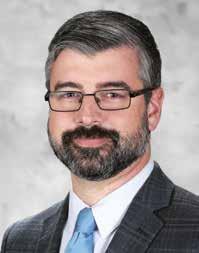

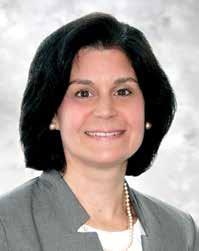
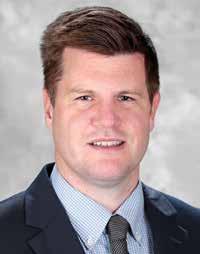
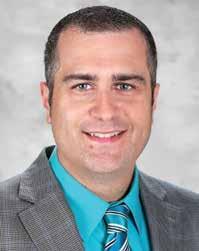



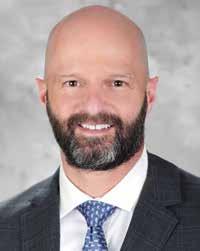


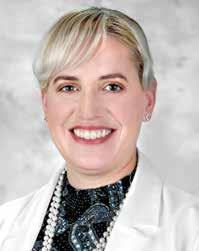
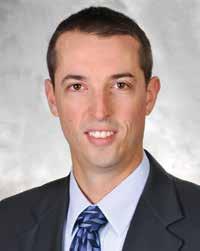
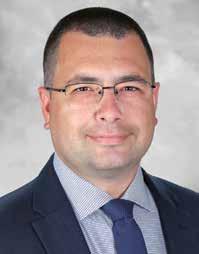









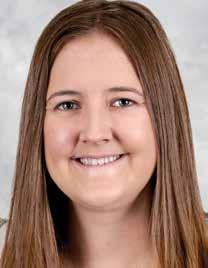
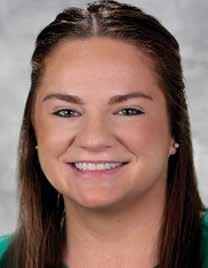



Christina Escobar, PharmD


Graduate of the University of Southern Florida College of Pharmacy
James Ning, PharmD

Graduate of the University of Illinois College of Pharmacy
Completed PGY1 Health System Pharmacy Administration and Leadership Residency at Rhode Island Hospital
PGY2 AMBULATORY CARE PHARMACY PGY2 CRITICAL CARE PHARMACY
Elizabeth Salisbury, PharmD

Graduate of the University of Rhode Island College of Pharmacy
Vanamrung Isaragumpot, PharmD

Graduate of the Oregon Health & Science University
Completed PGY1 Community-based Pharmacy Residency at the in Portland, Oregon University of North Carolina, Chapel Hill
Completed PGY1 Pharmacy Residency at Rhode Island Hospital
Amanda Hutchinson, PharmD
Graduate of the Massachusetts College of Pharmacy and Health Sciences University, Boston, MA
Completed PGY1 Pharmacy Residency at Emerson Hospital, Concord, MA
Shriji Amin, PharmD
Jessica Arabi, PharmD, BCCCP
Kristel Chatellier, PharmD, BCPS
Annaliese Clancy, PharmD, BCPS, BCCP
Giulia Conley, PharmD, BCPS
Mike Consaga, PharmD
Halley Gibson, PharmD, BCPS, BCCP
Rebecca Greene, PharmD, BCCCP
Justin Huynh, PharmD, BCOP
Patrick Lee, PharmD
Shannon Levesque, PharmD
Krista Mecadon, PharmD, BCTXP
Robert Mokszycki, PharmD, BCPS
Andrea Monckeberg, MS, RPh
Jessica Nagy, PharmD, BCPS
Kathleen Neves, PharmD
Ashlyn Norris, PharmD, BCIDP
Diane Parente, PharmD, BCIDP
Michelle Ting, PharmD, BCIDP
Steve Willis, PharmD
Morgan Wynes, PharmD, MBA, BCPS, BCCPS
Care, Evenings
Medicine
ICU
Medicine
Stewardship
ICU
Emergency Medicine
of Care
Organ Transplant
Medicine
Drug Trials
Medicine
Safety
Stewardship
Stewardship
Stewardship
ICU
Hematology/Oncology
Name Specialty
Sarah Albanese, PharmD, BCGP
Aisha Ashraf, PharmD, CDCES
Primary Care, Clinical Integration
Diane Ayuninjam, PharmD, MPH, AAHIVP Infectious Diseases
Amy Brotherton, PharmD, AAHIVP, BCIDP Clinical Coordinator, Infectious Diseases
Robert Brunault, PharmD, BCOP
Alyssa Capuano, PharmD, BCACP
Robin Carey, PharmD, BCACP Clinical Coordinator, Anticoagulation
Erin Connolly, PharmD Infammatory Diseases, GI
Ann-Marie Coroniti, PharmD, BCIDP Infectious Diseases
Alexa Donovan, PharmD, CDOE Endocrine
Katherine Duprey, PharmD, BCACP, CDOE, Clinical Coordinator, Primary Care
CVDOE
Michelle Gauvin, PharmD, BCACP, BCGP, CDCES Primary Care, Clinical Integration
Katherine Harte, PharmD
Kristina LaPerriere, PharmD, CDOE, CVDOE Cardiology, Heart Failure
Lauren Lemke, PharmD, BCPS
Justin Liauw, PharmD, BCOP
Alissa Margraf, PharmD, BCACP Infammatory Diseases, GI
Kathryn McCoart, PharmD, MBA
Clinical Coordinator, Specialty Compliance & Accreditation RIH
Hannah Means, PharmD Oncology RIH
Elizabeth Medeiros, PharmD
Safya Naidjate, PharmD, BCACP, CDCES
Amy Phelps, PharmD
Diana Rebello, PharmD
Cristina Santos, PharmD, CDOE, CVDOE
Megan Scalia, PharmD
Laura Varnum, PharmD, BCACP
Kenneth Wagg, RPh
Melissa Wilk, PharmD, BCACP, CDOE, CVDOE
Allison Zuern, PharmD, BCPS
Pulmonary, Cystic Fibrosis/Asthma RIH
Primary Care, Clinical Integration RIH
Infammatory Diseases, Dermatology/ Rheumatology RIH
Primary Care, Clinical Integration RIH
Primary Care, Clinical Integration RIH
Primary Care RIH
Infammatory Diseases, GI/ Rheumatology
Hemophilia/Sickle Cell RIH
Primary Care, Clinical Integration RIH
Infammatory Diseases, Rheumatology RIH
• Sponsored and supported Innovation Challenge Award winner of LCI service line, with successful transition of phase 1 (5 FTEs) thus far to improve employee retention.
• Engaged pharmacy resident research stakeholders to revamp the PRPC submission form, implement a residency research certifcate (2 presentations complete to date, and implement a fipped research model – which yielded >50 resident research proposals from Lifespan residency preceptors).
• Supported system wide dispense track implementation, resulting in measurable decreases in daily missing medication requests.
• Supported Kitcheck RFID implementation at RIH and TMH, resulting in measurable cost avoidance and increased medication availability.
• Supported Omnicell stewardship council data infrastructure build responsible for the development of several medication distribution model key performance indicators.
• Supported formulary optimization and an 80% reduction in non-formulary “noise” during pharmacist order verifcation via Epic build clean up and P&T formulary addition work.
• Facilitated system integration among affliate senior leadership to focus on MHT program development and optimization, with best possible med history complete capture rate metric improvement by 16%.
• Supported PowerBI dashboard build for Antimicrobial DOT reporting, demonstrating signifcant DOT reduction since 2017 parallel to ongoing ID/AMS clinical pharmacy specialist expansion.
• Supported system-wide subsidized pharmacy technician workforce pipeline training program with a hiring retention rate of 70.5%.
Inpatient Pharmacy: Rhode Island Hospital
• Expanded pharmacist clinical services in the adult emergency department on weekday evenings and overnights 7 days a week.
• Optimized Annex 4 offce space to accommodate clinical pharmacy team growth, with a 75% increase in available workstations and conference room technology to promote virtual communication.
• Supported scheduling coverage model conversion to 7on7off to improve employee retention.
• Implementing system-wide remote clinical pharmacist workforce to help streamline workfow, expand on-site decentralized practice model, optimize clinical monitoring tools and improve work/life balance.
Inpatient Pharmacy: The Miriam Hospital
• Expanded pharmacist rounding clinical services onto the Medicine Red Team.
• Implemented PAR level optimization algorithm that resulted in a 39% decrease in Omnicell stock outs.
• Response to drug shortages with the potential to impact patient care:
» The COVID-19 pandemic and supply chain issues challenged clinical services to identify necessary protocol and guideline revisions.
» Clinical specialists worked collaboratively with subject matter experts and other members of the care team to identify and implement alternative therapies and treatment plans. Alerts were developed in collaboration with the pharmacy information technology team to notify prescribers of alternative therapies.
◊ Injectable diuretic bumetanide: Developed electronic alternative alerts for providers to consider the use of enteral formulations or alternate intravenous loop diuretic therapy.
◊ Concentrated albuterol nebulization solution: Clinical pharmacist specialists collaborated with respiratory therapists to develop innovative delivery methods for nebulized albuterol to pediatric patients with severe asthma exacerbations and adult patients on extra corporeal membrane oxygenation (ECMO).
◊ Valproic Acid Injection: Developed electronic alternative alerts for providers to consider the use of enteral formulations and clinical specialists in the emergency departments and neurocritical care unit collaborated with providers on the use of alternative antiepileptic medications.
◊ Dextrose 50% Injection: Collaboration with subject matter experts from endocrinology to use a 10% dextrose infusion in place of 50% vials and syringes of dextrose. This required collaboration with nursing as a result of necessary revisions to order panels for management of hypoglycemia.
◊ Low osmolality contrast media (LOCM): Participated in a multidisciplinary task force (radiology, cardiology, vascular surgery, neurosurgery, endoscopy, and emergency medicine) to develop a mitigation plan to minimize the impact on patient care.
• Ambulatory Subcommittee of the Pharmacy and Therapeutics Committee
» The subcommittee was established to provide evidence-based consensus recommendations to the Pharmacy and Therapeutics Committee related to medication utilization at Lifespan ambulatory care facilities. Functions include assuring safe, effcacious, and cost-effective medication use at Lifespan ambulatory care facilities; reviewing and recommending the approval or denial of collaborative practice agreements; and reviewing medication-related ambulatory practice portions of policies and procedures, guidelines, and order sets.
» Completed a therapeutic class review.
» Reviewed the formulary addition of eleven medications used in the ambulatory infusion clinics
• Antithrombotic Subcommittee of the Pharmacy and Therapeutics Committee
» Reviewed and recommended revisions to three drug therapy and therapeutic guidelines.
• Anticoagulation Stewardship
» Anticoagulation Clinical Pharmacist Specialist was hired.
• Antimicrobial Stewardship Team
» Reviewed and updated twenty drug therapy and therapeutic guidelines.
» Considered two formulary deletions and recommended one deletion.
» Completed a therapeutic class review on use oral cephalosporins which resulted in the formulary deletion of cefxime and the addition of cefpodoxime.
• Oncology Subcommittee of the Pharmacy and Therapeutics Committee
» Collaborated with the adult sickle cell and hemoglobinopathy service to include a section in the chemotherapy practice standard allowing for relevant specialty service advanced practice providers and fellows to prescribe agents within their scope of practice including oral hydroxyurea.
» The intrathecal anticancer medication administration policy and procedure was updated to outline the process for credentialed advanced practice providers to administer intrathecal chemotherapy.
» Reviewed and revised eight drug therapy and therapeutic guidelines.
» Recommended one formulary deletion.
• Recruitment
» Successfully hired into nine new clinical specialist positions
◊ Anticoagulation Stewardship (1)
◊ Adult Emergency Medicine (2-RIH, 2-TMH)
◊ Adult Internal Medicine (1)
◊ Pediatric Emergency Medicine (1)
◊ Pediatric Oncology Hematology (1)
◊ Adult Hematology Oncology (1)
• Formulary Management Activities
» Participated in the development and modifcation of existing protocols and drug therapy and therapeutic guidelines.
◊ Nine new
◊ Forty revised
◊ Eleven retired
» Completed seven medication use evaluations.
» Completed eleven therapeutic class reviews.
» Fifty-seven drugs added to the formulary.
◊ Thirteen formulary additions via monograph reviews
◊ Eleven via therapeutic class review by ambulatory subcommittee
◊ Thirty-three collaborations with subject matter experts from radiology and nuclear medicine
» Deleted ten medications from the formulary including intravenous promethazine.
» Completed fve formal adverse drug event and trend reviews.
» Ten online formulary management forums were launched representing physician specialists, pharmacist specialists, and nurse specialists, who collaborated to forge consensus recommendations regarding formulary management and patient safety initiatives.
• Additional accomplishments and recognition:
» Enhancements were made to the policy titled “Formulary, Drug”. When new medications are requested and reviewed, the formulary status will be categorized as follows: “Formulary (available for any patient without restrictions)”, “Formulary, restricted (e.g., outpatient use, selected indication, Active Medical Staff, continuation of established home therapy )”, “Formulary, restricted to a medical service (i.e., prescriber must be a member of the selected medical service)”, “Formulary, restricted to formal consult (i.e., prescribing is restricted to formal documented consultation or antimicrobial approval)”, “Non-Formulary, orderable (not stocked, but is made available through the nonformulary process for specifc patient needs)”, and “Non-Formulary, not stocked, not orderable”.
» Conversion of intravenous (IV) levetiracetam (Keppra) infusions to IV push for doses less than or equal to 1,500 mg. Resulted in ~$70,000 in savings and ~ 2,000 less nurse mixes on patient care units.
» Deprescribing of lactinex for ventilator associated pneumonia in the neurointensive care unit. Resulted in $7,000 in drug savings and reallocation of pharmacy technician/pharmacist labor required to repackage 30,000 tablets annually.
• Recruited an experienced clinical pharmacist specialist to lead Lifespan Transitions of Care program optimization in FY23 with the following guiding principles and goals:
» Maximize patient outcomes
◊ Standardize hand off to in-network and out of network PCP and/or Lifespan ambulatory pharmacist and/or Lifespan ACO pharmacist and/or Coastal ambulatory pharmacist
» Maximize throughput/patient encounters per day
◊ Optimize RIH and TMH workfow and documentation
◊ Standardize disease state education tools and content
◊ Eliminate documentation redundancies
◊ Leverage technology on a patient specifc basis
◊ Continue to leverage pharmacy resident and student learners
• Developed and implemented the RxIT system to import dozens of fles automatically every day.
• Built queries to assist with ongoing clinical initiatives like Critical Care Insulin MUE.
» This critical care infusion data analysis project explores the potential demographic and health status risk factors associated with hypoglycemia in the critical care setting. The purpose of this project is to make a potential change to the current insulin infusion protocol.
• Implemented a new inventory system to seamlessly import the Capital Inventory count.
• The International Normalized Ratio project helps predict if patients would have an INR over 4 based on lots of demographic factors, documented testing history and medication history factors.
• Estimated the 340B value of a referral program to see how much it would be worth after a list of constraints in difference made by the cost of 340B and GPO.
• Brought new FastFill machines online at TMH LP
• Creation of new medication (ERX) and immunization (LIM) records for every new Covid-19 vaccine, to allow them to be ordered/charted/populate the patient’s immunization record.
• Creation and continual updates to every new medication record (ERX) added to Lifespan formulary, and/or used in the LCI’s or inpatient including antineoplastics and monoclonal antibodies.
• Created dose standardization protocols to cut down on waste for dozens of medications including Calaspargase-pegol (Asparlas®), pegaspargase (Oncaspar®), algucosidase (Lumizyme®), avalglucosidase (Nexviazyme®), epoetin and biosimilars (Procrit, Epogen, Retacrit) for inpatients, and others.
• Tested and adjusted as necessary all continuous infusion records in scope for Baxter Smart Pump integration.
• Reporting of medication safety issues and suggestions for best practices to the Institute for Safe Medication Practices (ISMP), several of which were published in their nationwide Medication Safety Alert.
• Optimization of Epic-based system build to support appropriate ordering, dispensing, and monitoring of selected medications with an FDA Risk Evaluation and Mitigation Strategy (REMS) program.
• Development of new PowerBI reporting tools to assist in identifcation and analysis of trends for medication safety event reporting.
• Ongoing monitoring and optimization of system-wide medication safety technology, including:
• Barcode Assisted Medication Administration (BCMA) rates > 95% for all inpatient adult and pediatric med/surg, ICU units (Leapfrog-defned areas). For Emergency Departments, BCMA rates increased to >80% system wide.
• Medication override rates from automated dispensing cabinets (Omnicell) of ~0.6%.
» Smart infusion pump drug library utilization rates of >98% systemwide.
• Conversion of policies to new online policy portal (PolicyStat), optimization of system to improve policy review workfow and timeliness.
LACPN: Retail Pharmacy Services
• Collaboration with TMH Investigational Pharmacy to provide oral monkeypox treatment from retail pharmacy.
• Collaboration with Gateway leadership on quality and safety improvements.
• Installation of pharmacy automation (FastFill 54) with integration into Willow Ambulatory at The Miriam Hospital.
• Transition of Comprehensive Medication Management (CMM) services at cardiac and pulmonary rehab to Lifespan Pharmacy.
• Inclusion of Lifespan Pharmacy in preoperative bariatric surgery classes.
• Review and enhancement of non-sterile compounding procedures.
• Lifespan Pharmacy technician recognized as Newport Hospital Employee of the Month.
• Multiple staff members recognized as part of Lifespan System Great Catch patient safety program.
LACPN: Specialty Pharmacy Services
• Continued Tier 1 employee engagement.
• Expanded care to pediatric patients with infammatory diseases and to adults with certain neurologic disorders.
• Expanded patient care opportunities through partnerships with Blue Cross Blue Shield of Rhode Island, Aetna, and NHPRI.
• The clinical services team was actively involved in the provision of quality health care under the continued constraints of the COVID-19 pandemic as follows:
• Adapted delivery of health care to incorporate telehealth options for continuity in care of patients.
• Development of the Outpatient COVID-19 Therapy Protocol and workfows for ambulatory care pharmacists to collaborate with providers in the treatment and prevention of COVID-19 for eligible patients.
• Rhode Island Collaborative for Interprofessional Education and Practice Health System Transformation Project
• Enhancement of learner opportunities by accommodating almost double the number of PGY1 pharmacy residents and pharmacy students in the primary care spaces.
• Retention of 2 out of 3 PGY2 Ambulatory Care residents who accepted Clinical Pharmacist Specialist positions at Lifespan.
• Development of drug therapy and therapeutic guidelines for HIV Pre-Exposure Prophylaxis (PrEP).
• Addition of point-of-care INR testing for patients on anticoagulation at the Center for Primary Care. Huge endeavor in collaboration with Lifespan Labs and IT to promote patient care, safety and satisfaction.
• Care Transformation Collaborative of Rhode Island Grant Recipient for Continuous Glucose Monitoring
• Completed actionable Dashboards for outcome measures, with three already integrated in LifeChar. The Clinical Integration Pharmacy Team of Lifespan Health Alliance received awards for #1 System of Care for the BCBSRI for the third consecutive year and #1 System of Care for UHC for the second consecutive year achieving Five Stars on all Medication Measures on the MA-PCPi program.
Growth/Expansion:
• Added 17 full time employees, 4 pharmacists and 13 pharmacy technicians to the workforce, with major growth in MAP. It expanded prescription support services to all Cardiovascular Institute patients in May, 2022. This resulted in an increase in work volume and prescription capture rate.
Primary Care:
• Increased workforce to enable us to expand services (creation of polypharmacy clinic and initiation of clinical pharmacy support for patients in the adult Pulmonary resident clinic) in FY2023.
• Increased workforce also provides coverage for clinical team leading to better job satisfaction.
• Added 0.2 FTE to Medicine-Pediatrics clinic coverage.
• Established 340B ESP Data Sharing program.
• Developed rigorous program for surveillance of receivables for Lifespan Pharmacy, LLC.
• Outsourced annual inventory to third-party vendor.
• Developed a new drug shortage pharmacist position.
• Led assessment and fnancial planning for consideration of a Consolidated Service Center (CSC) for the pharmacy enterprise.
• Implemented purchasing analytics partnership with Kitcheck’s Bluesight Insights®
Residency Programs: Post-Graduate Year 1 (PGY1) Pharmacy Residency Program at Rhode Island Hospital
• Two of the program’s 2021-2022 four graduating residents have successfully pursued a postgraduate year two (PGY2) pharmacy:
» PGY2 oncology at Yale New Haven
» PGY2 critical care at Rhode Island Hospital
• Remaining graduating resident obtained the following position:
» Multi-specialist pharmacist at Brigham and Women’s
Residency Programs: Post-Graduate Year 2 (PGY2) Ambulatory Care Pharmacy Residency Program
• Continued streamlining of service commitment rotation at Lifespan Specialty Pharmacy to include residents in clinical assessments of patient care, along with medication dispensing.
